Boris Johnson’s response to the coronavirus crisis will help banks and landlords more than families, according to a think tank.
The measures include a furlough scheme which pays workers 80 per cent of their wages, in a bid to prevent redundancies.
But almost half that money will be spent on rent and debt repayments, an analysis by the Institute for Public Policy Research (IPPR) found.
Download the new Independent Premium app
Sharing the full story, not just the headlines
The support amounts to an “implicit bail-out” of landlords and banks in the middle of the global pandemic, the organisation claims.
IPPR also warns that overall the government’s package of policies, designed to prevent an economic as well as a public health crisis, will increase inequality across the country.
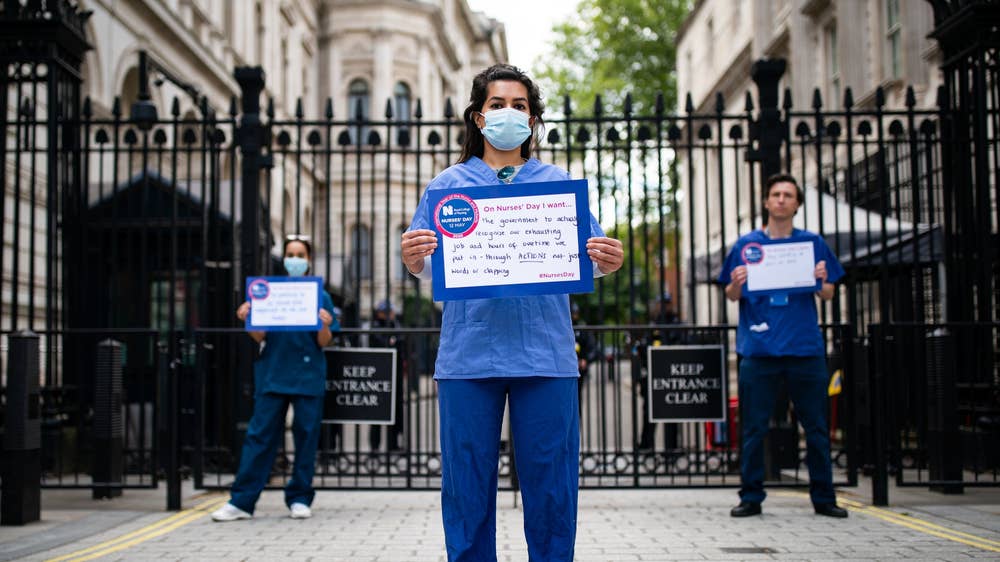

1/50 12 May 2020
Nurses from central London hospitals protest on international nurses day about the chronic underfunding of the NHS and other issues surrounding the health service outside the gates of Downing Street, London
PA

2/50 11 May 2020
Waves crash at Tynemouth pier on the North East coast
PA
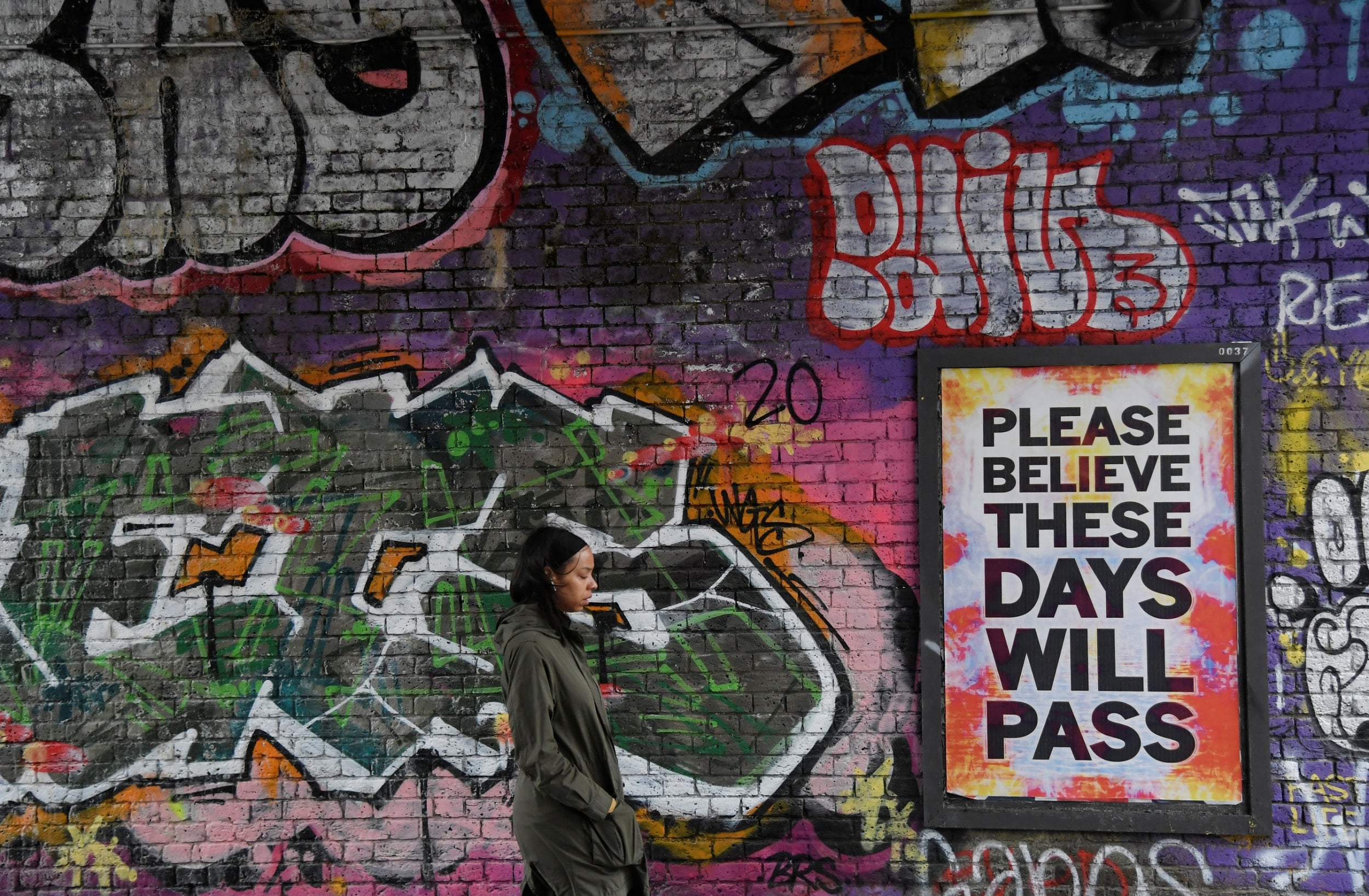
3/50 10 May 2020
A woman passes street art and a poster in East London
Reuters
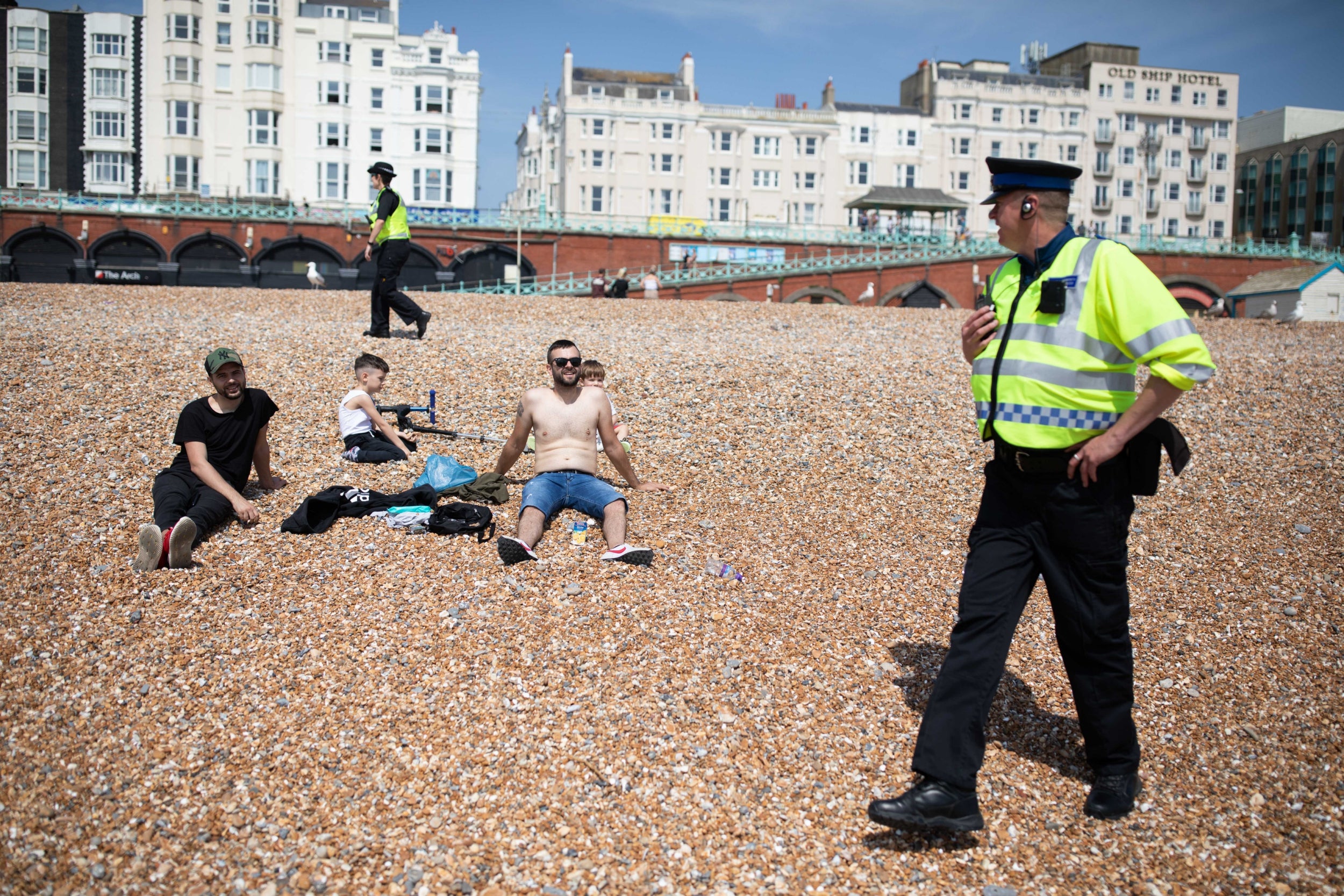
4/50 9 May 2020
Police patrol the beach in Brighton
Getty

5/50 8 May 2020
The British Royal Air Force Red Arrows conduct a fly past over the statue of former British Prime Minister Winston Churchill in London to commemorate the 75th Anniversary of Victory in Europe (VE Day) in Britain
MOD/Reuters
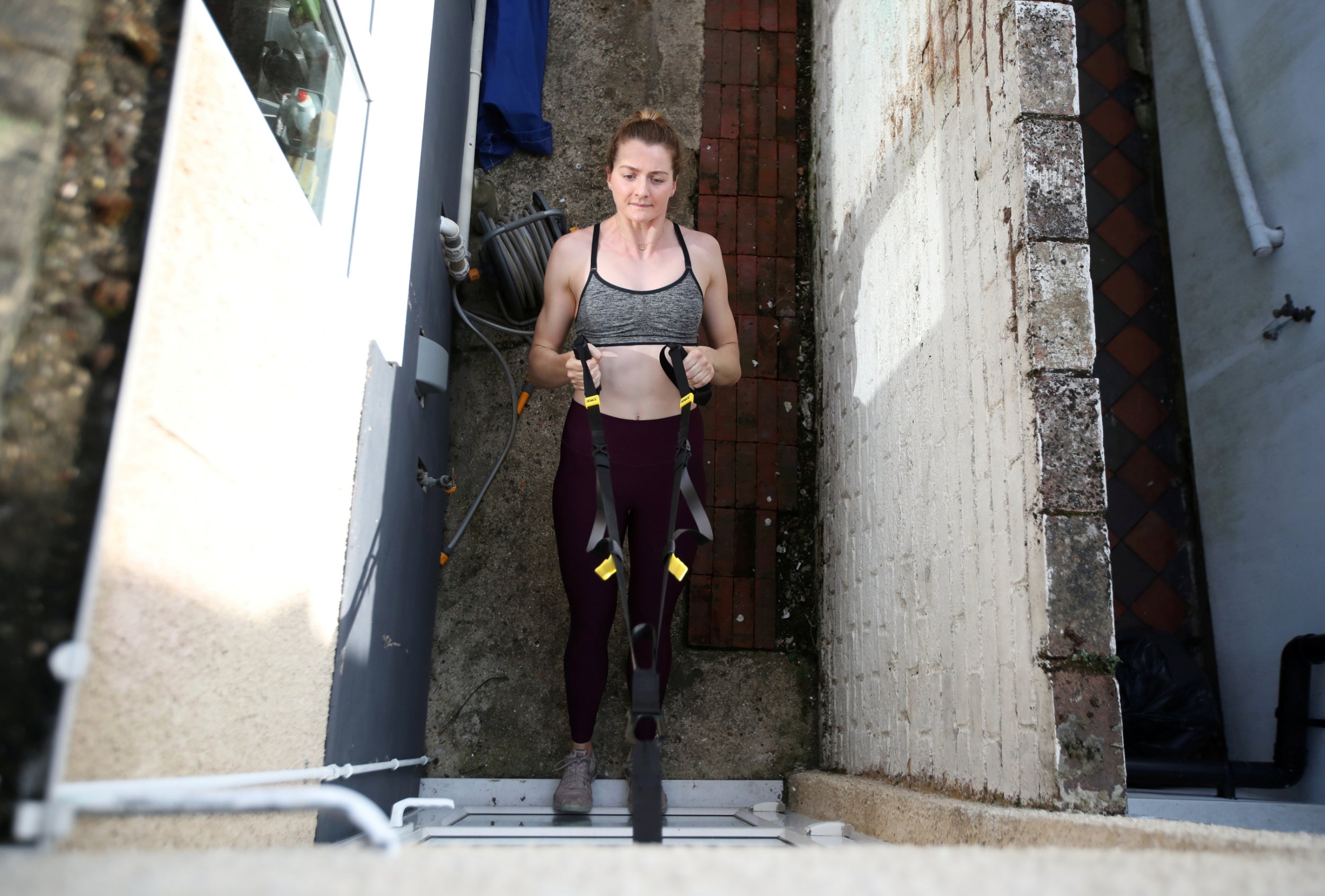
6/50 7 May 2020
Team GB sailor Eilidh McIntyre during a training session at her home in Portsmouth
Reuters
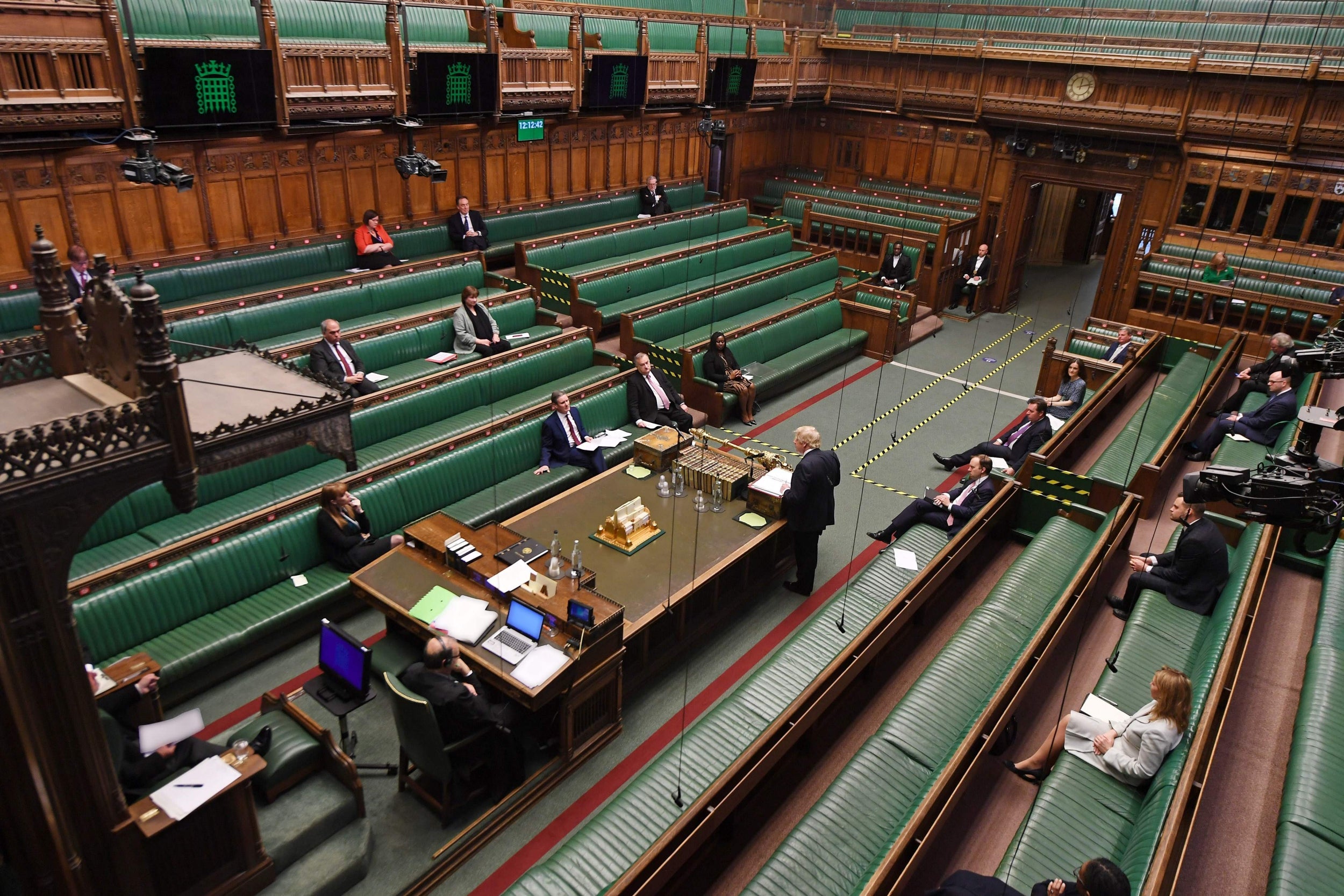
7/50 6 May 2020
Labour Party leader Keir Starmer listens to Prime Minister Boris Johnson speaking during PMQs
UK Parliament/AFP/Getty

8/50 5 May 2020
The sun appears to explode over the horizon in this montage of images captured by photographer Nick Lucas near his home in Ringwood, Hampshire. Nick took a number of pictures just a few seconds apart on a tripod mounted camera which were then combined to give the eye catching dawn image
Nick Lucas/SWNS

9/50 4 May 2020
Leeds Green Watch firefighters observe a minute’s silence outside the fire station in Kirkstall Rd, in memory their colleagues that lost their lives in the line of duty
PA
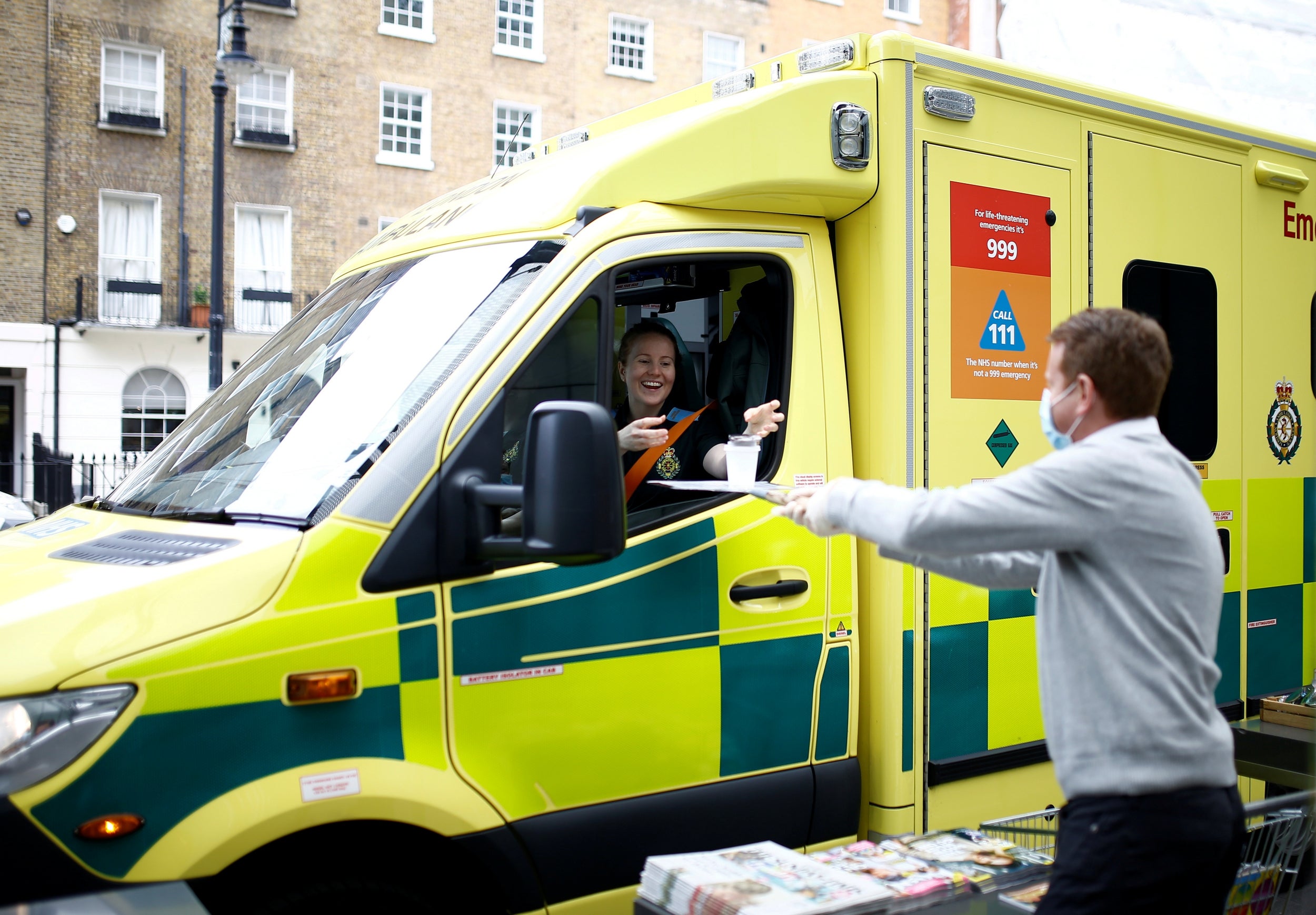
10/50 3 May 2020
Staff at The Berkeley hotel give food to ambulance workers
Reuters
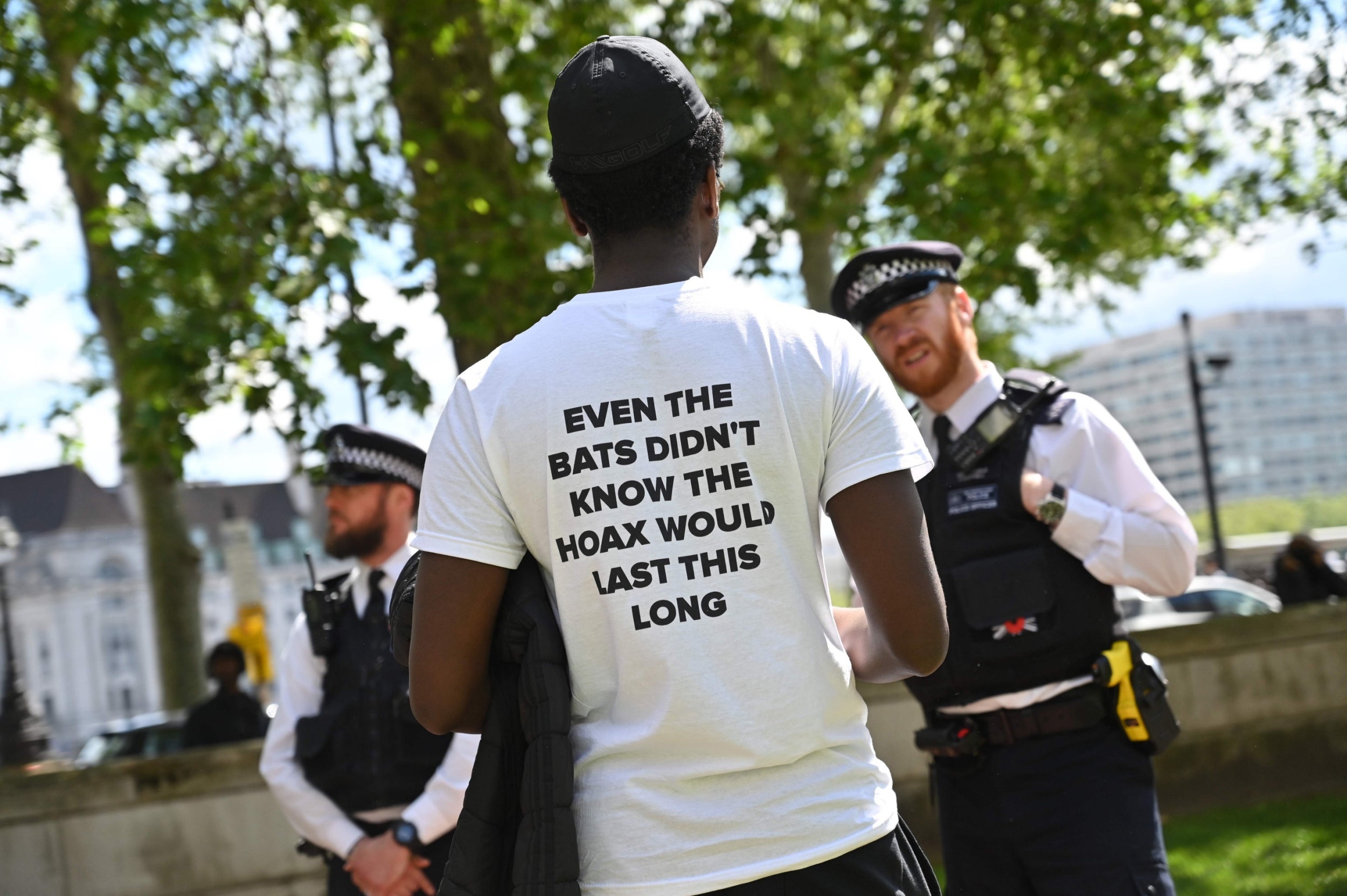
11/50 2 May 2020
One of a small group of anti-lockdown protesters speaks to a police officer as they gather outside New Scotland Yard in Victoria, London
AFP via Getty
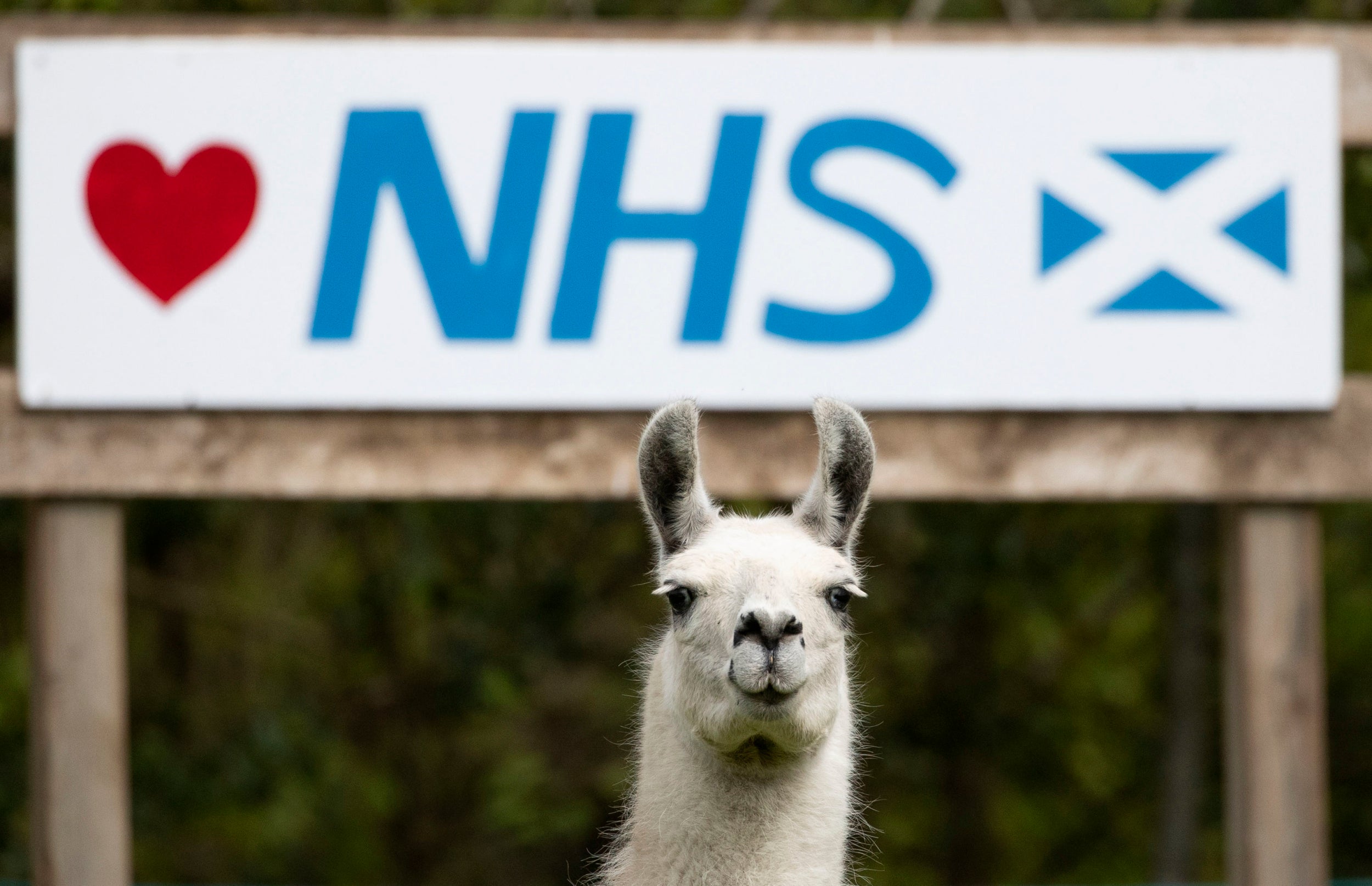
12/50 1 May 2020
Bonnie the Llama grazes in a field in the Scottish Borders alongside a sign supporting the NHS as the UK continues in lockdown
PA

13/50 30 April 2020
Colonel Tom Moore and his daughter Hannah celebrate his 100th birthday, with an RAF flypast provided by a Spitfire and a Hurricane over his home in Marston Moretaine. Colonel Moore, formerly a Captain, received a promotion in honour of his birthday and in recognition of the funds, in excess of £30m, he raised for the NHS by walking laps of his garden
Capture the Light Photography/Getty
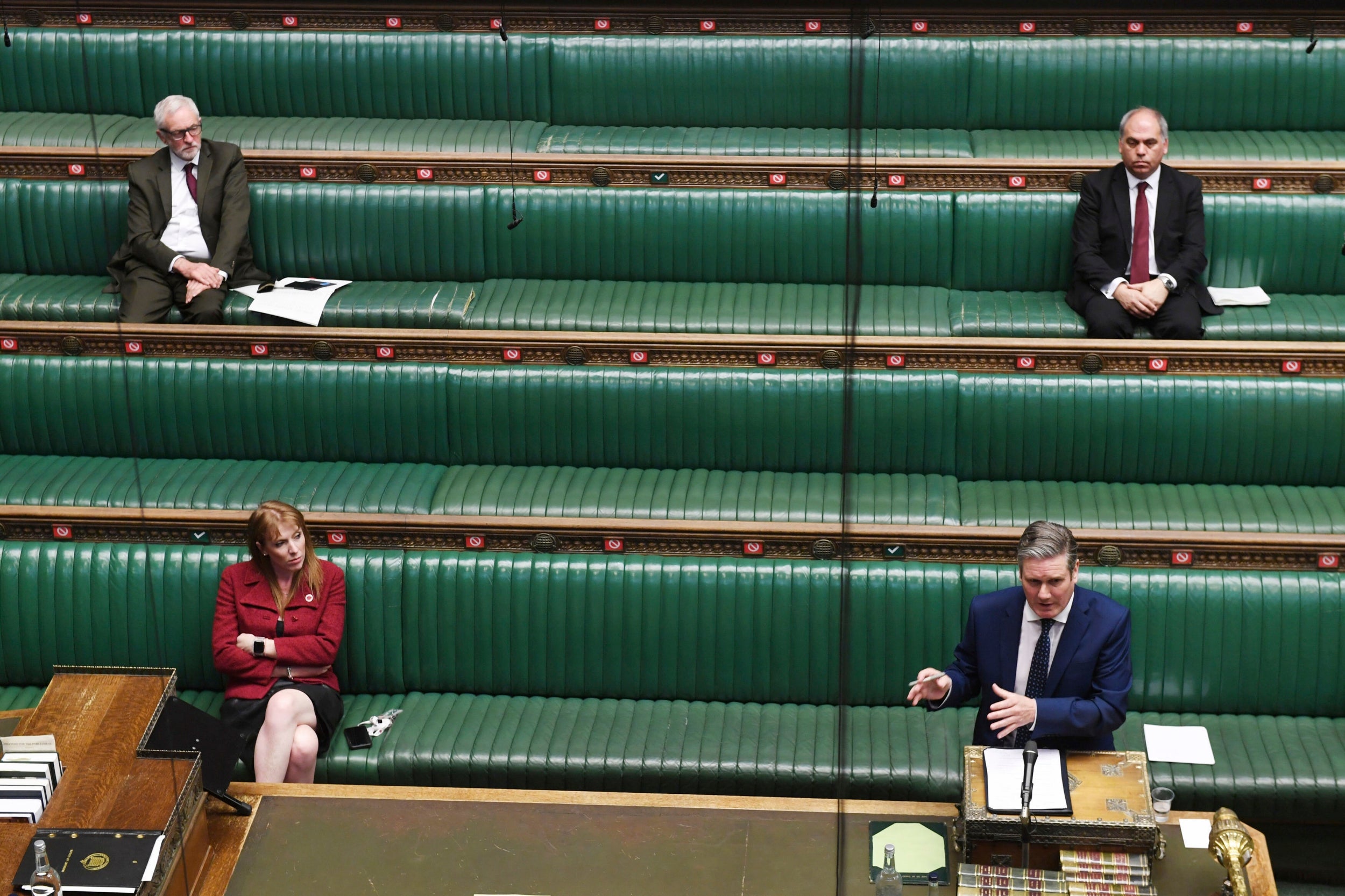
14/50 29 April 2020
Britain’s Labour leader Keir Starmer speaks during Prime Minister’s Questions, as members of Parliament observe social distancing due to the coronavirus, in the House of Commons, London, Wednesday, April 29, 2020
UK Parliament/AP
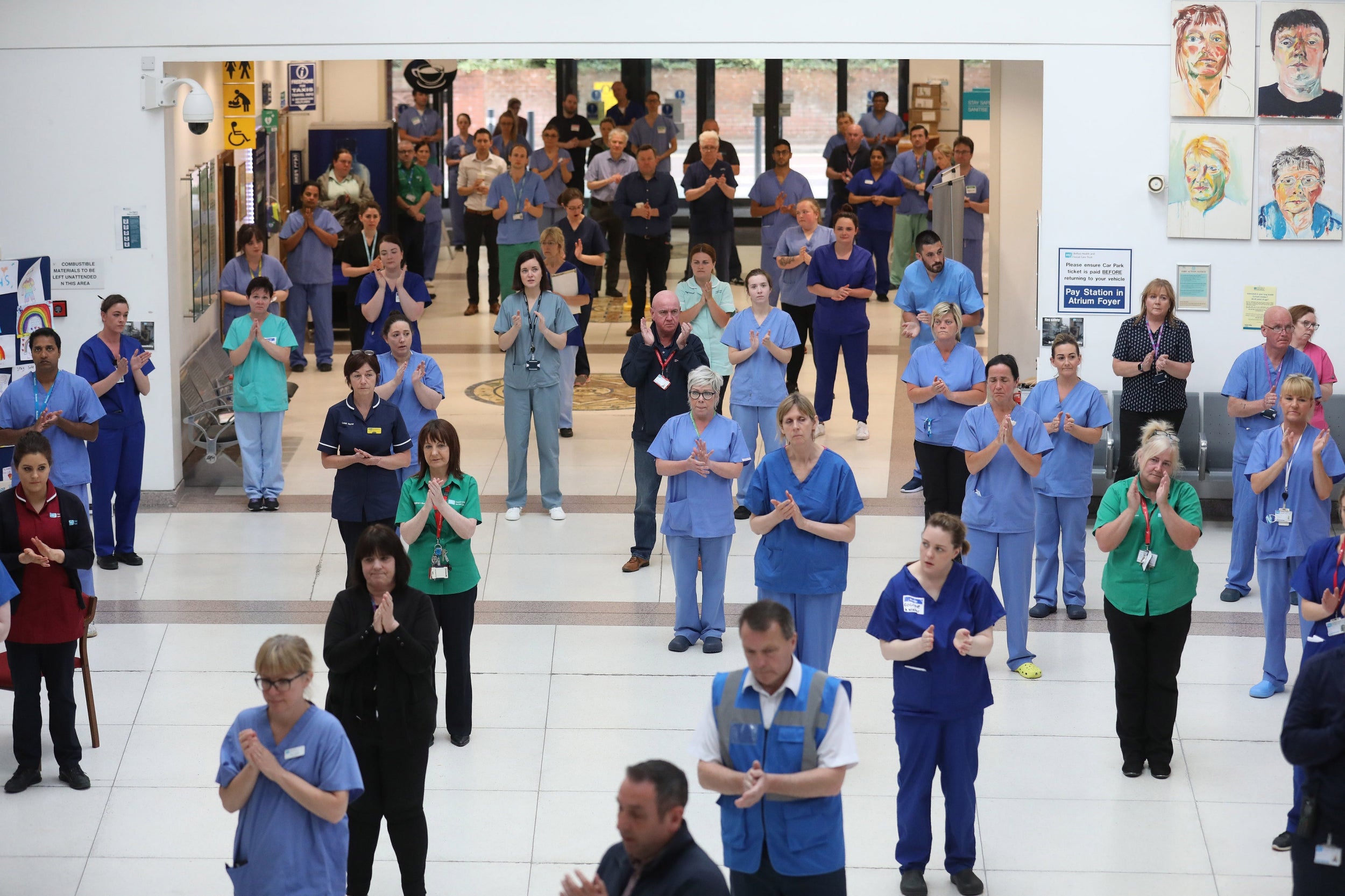
15/50 28 April 2020
NHS staff at the Mater hospital in Belfast, during a minute’s silence to pay tribute to the NHS staff and key workers who have died during the coronavirus outbreak
PA

16/50 27 April 2020
The sun rises behind redundant oil platforms moored in the Firth of Forth near Kirkcaldy, Fife. Global oil prices have crashed after the coronavirus pandemic reduced demand, with analysts warning that the oil majors may be looking at one of their biggest quarter-on-quarter profitability hits in history.
PA

17/50 26 April 2020
Frankie Lynch celebrates on the Mall where the finish of the London Marathon was due to take place today after running 2.6 miles instead of 26 miles to raise money for The Running Charity
Reuters

18/50 25 April 2020
A muslim woman walks past balloons outside the National Hospital for Neurology and Neurosurgery in London
Reuters

19/50 24 April 2020
An empty Brighton Pier, closed during the Coronavirus pandemic as temperatures reach 20 degrees in the South East
Rex

20/50 23 April 2020
Farmers work with vehicles to prepare a field next to a field of flowering rapeseed near Pontefract, West Yorkshire
AFP/Getty

21/50 22 April 2020
The Northern Lights, the Milky Way and a Lyrid meteor at the Bathing House near Howick, Northumberland, as the Lyrid meteor shower reached its peak
PA

22/50 21 April 2020
Badger the Border Collie surrounded by bluebells at Shrawley Wood in Worcestershire
PA

23/50 20 April 2020
A dog walker on Blyth beach in Northumberland
PA

24/50 19 April 2020
A piece of coronavirus themed street art grafitti in East London
AFP via Getty
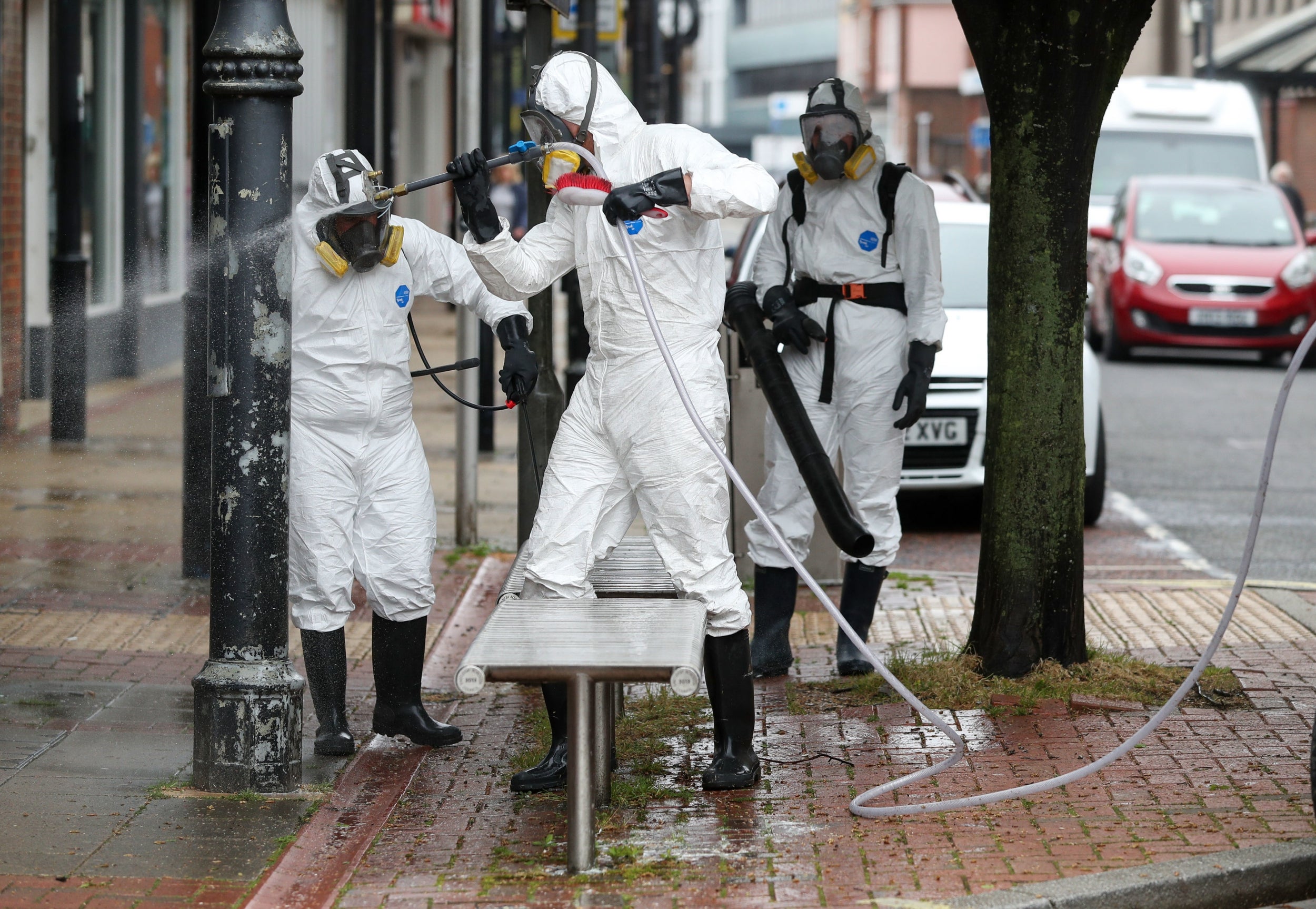
25/50 18 April 2020
Members of the City Specialist Cleaning team spray disinfectant around posts in the town centre of Eastleigh, Hampshire
PA
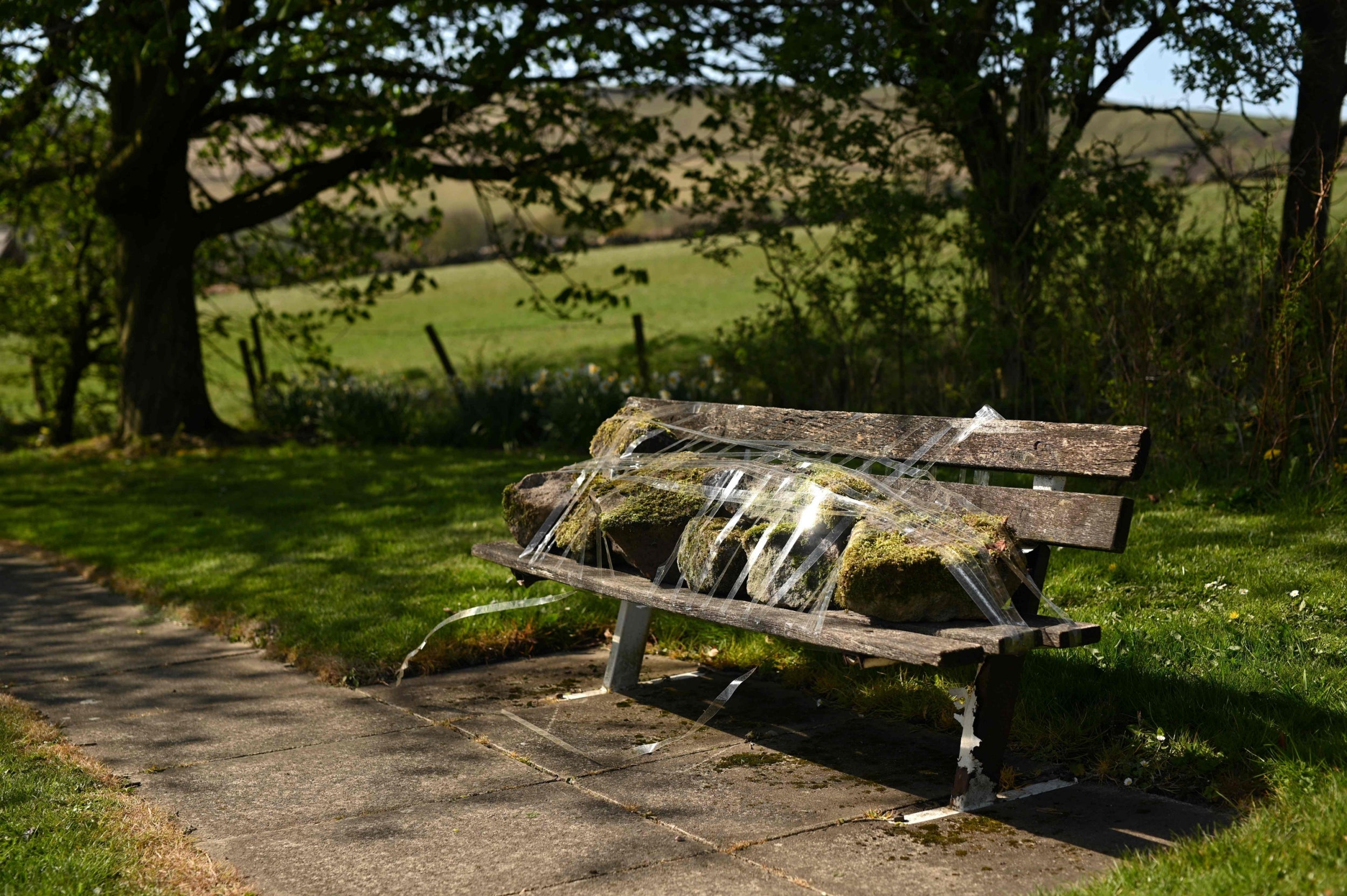
26/50 17 April 2020
A taped-up bench in the hamlet of Diglea, Greater Manchester
AFP/Getty
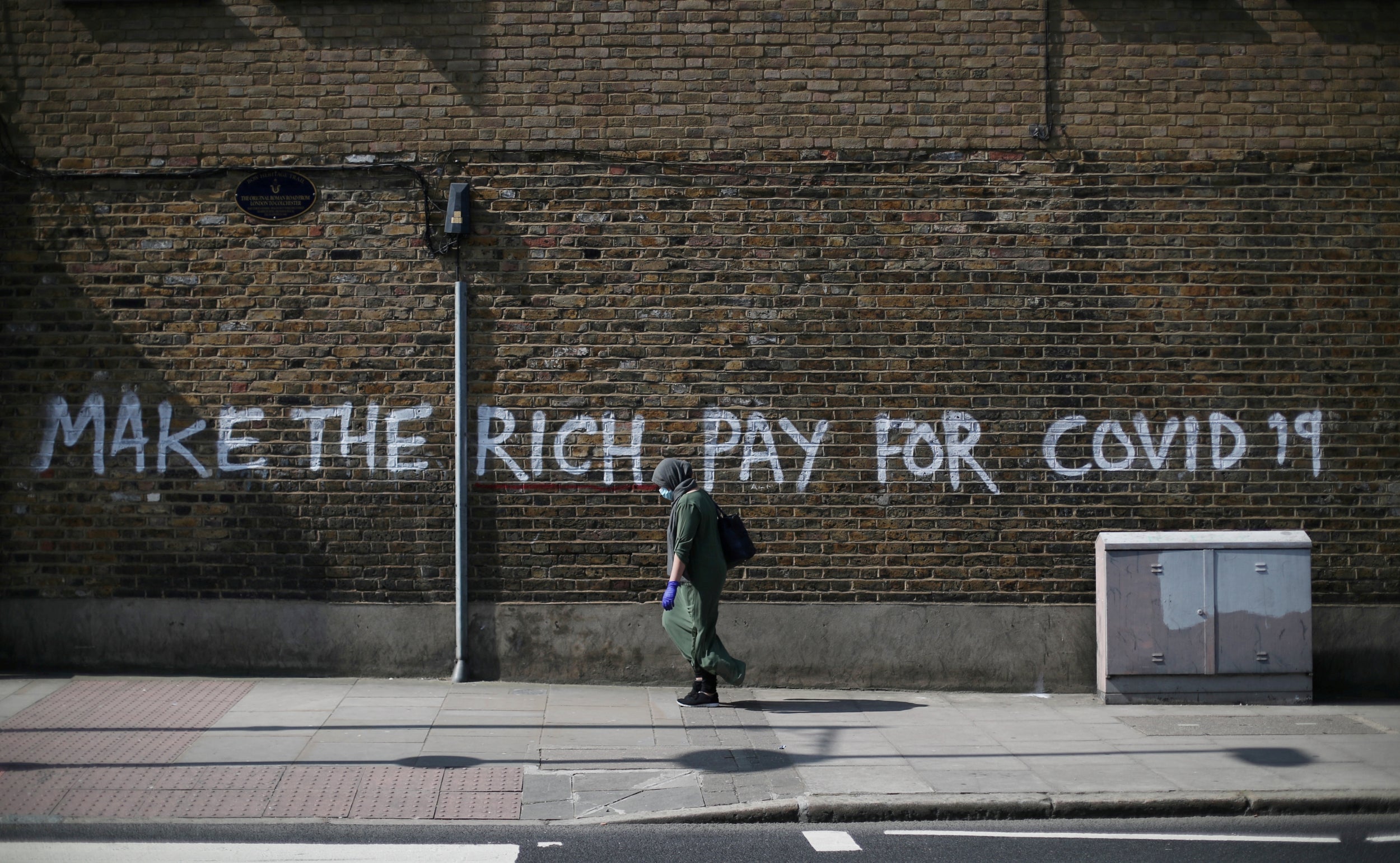
27/50 16 April 2020
A woman wearing a protective face mask and gloves walks past graffiti in Bow, London
Reuters
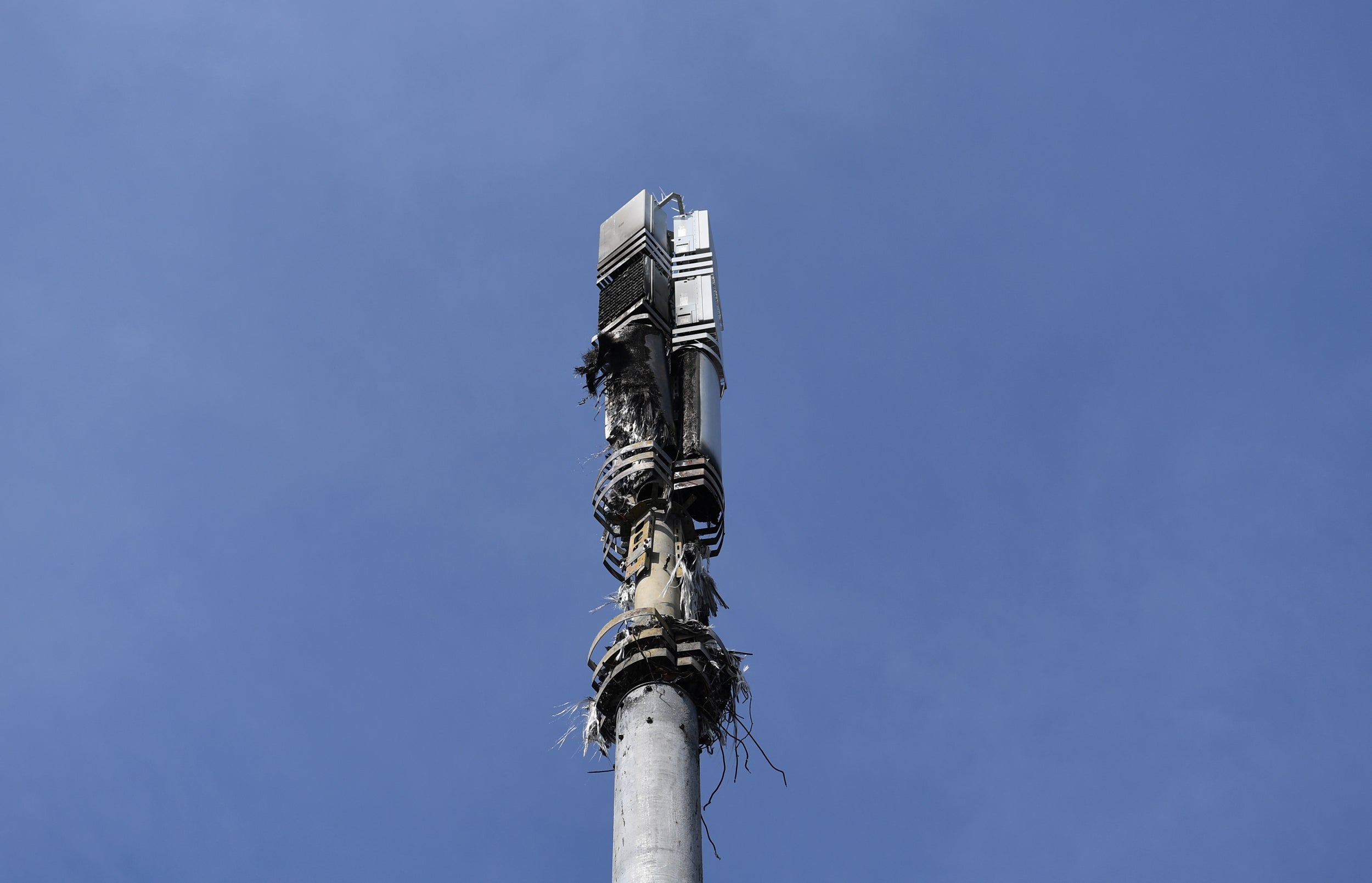
28/50 15 April 2020
A burned down mobile phone mast in London. According to reports, at least 20 mobile phone masts across Britain are believed to have been vandalised and government and telecom sources are increasingly concerned about the impact of conspiracy theories linking coronavirus to 5G networks
EPA
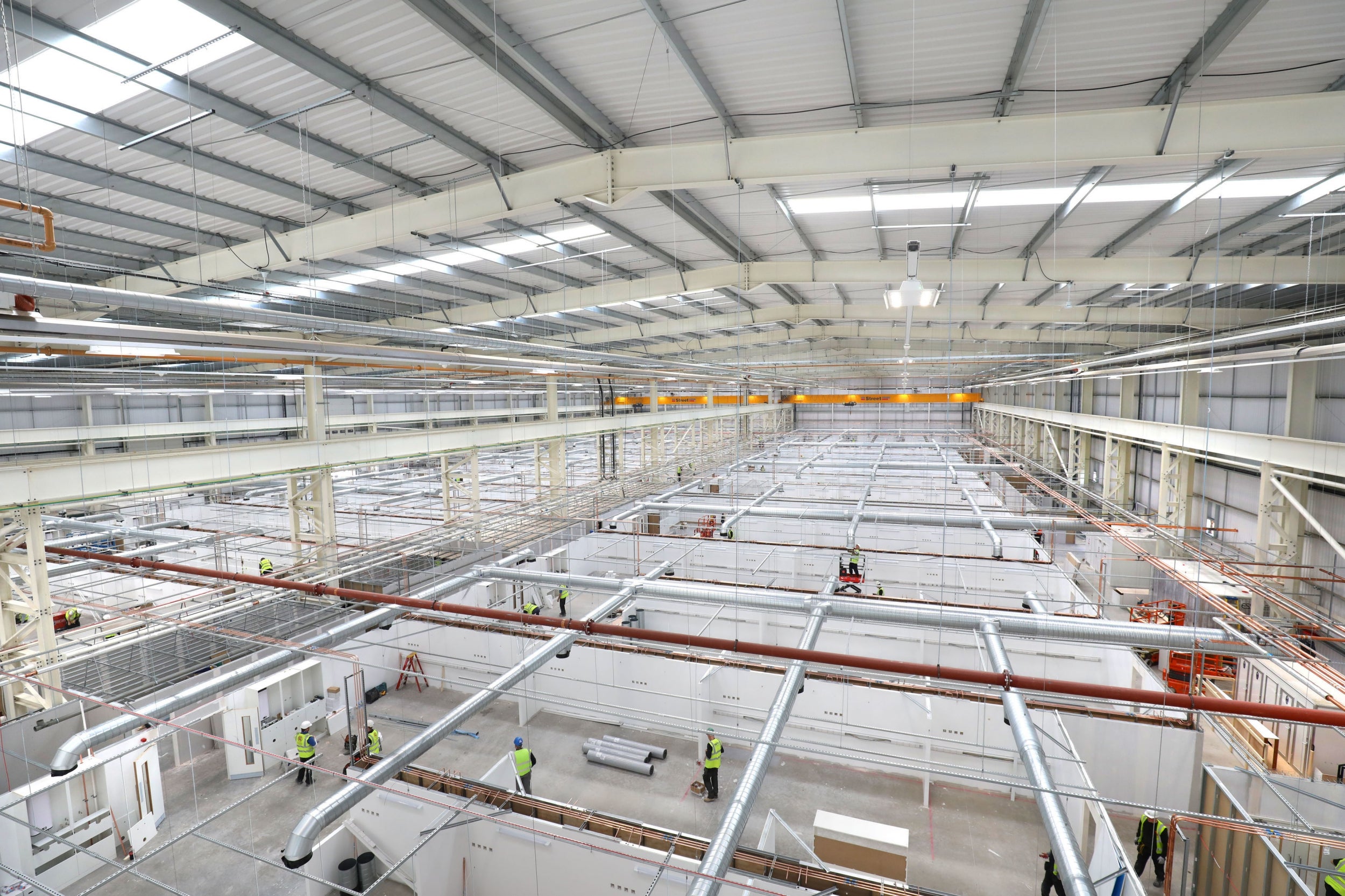
29/50 14 April 2020
The new Nightingale Hospital in Washington, Tyne and Wear, being fitted out
PA

30/50 13 April 2020
Walkers enjoy the bluebells in Wanstead Park in London
PA
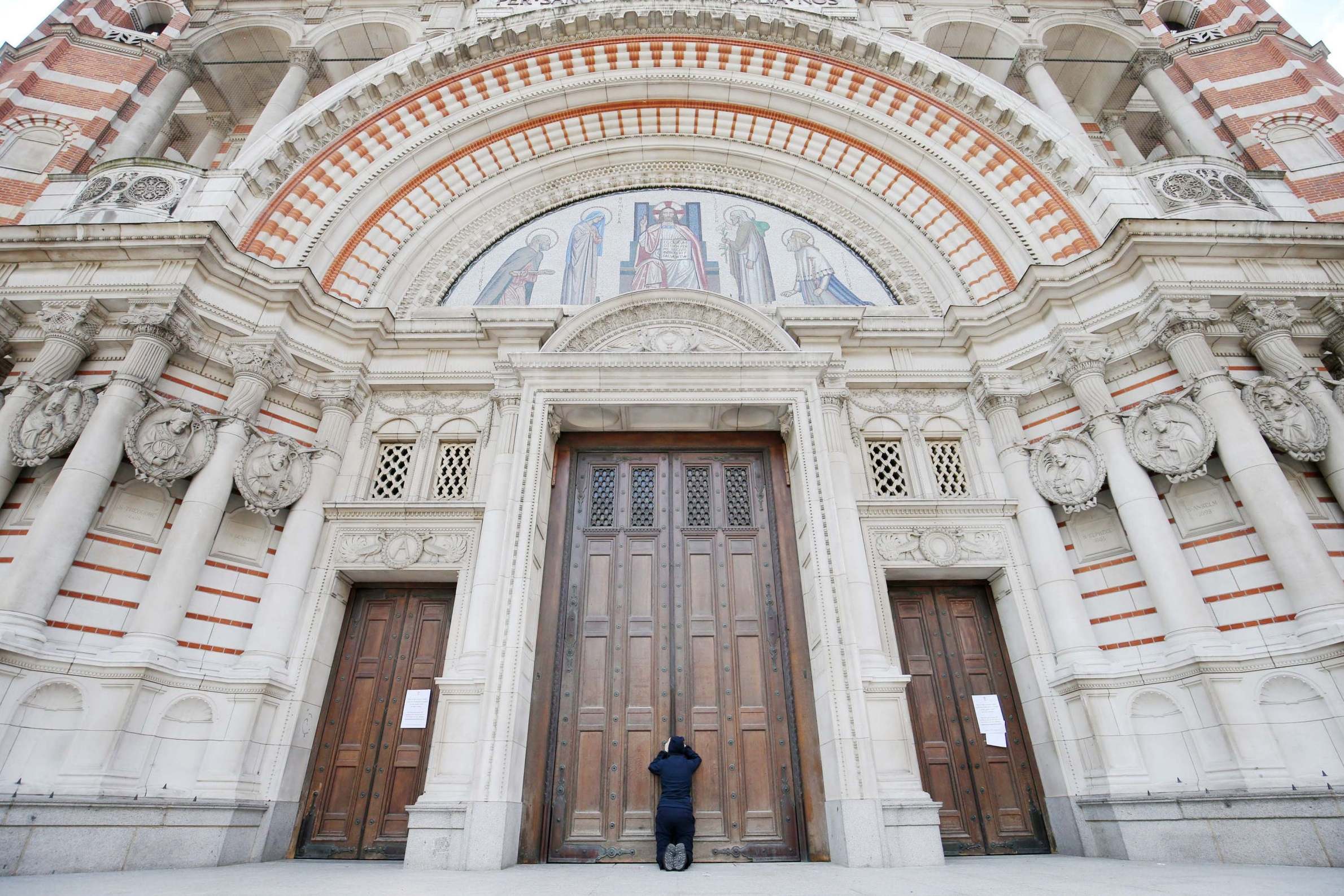
31/50 12 April 2020
A woman prays at the closed doors of Westminster Cathedral ahead of the Easter morning mass in London
PA
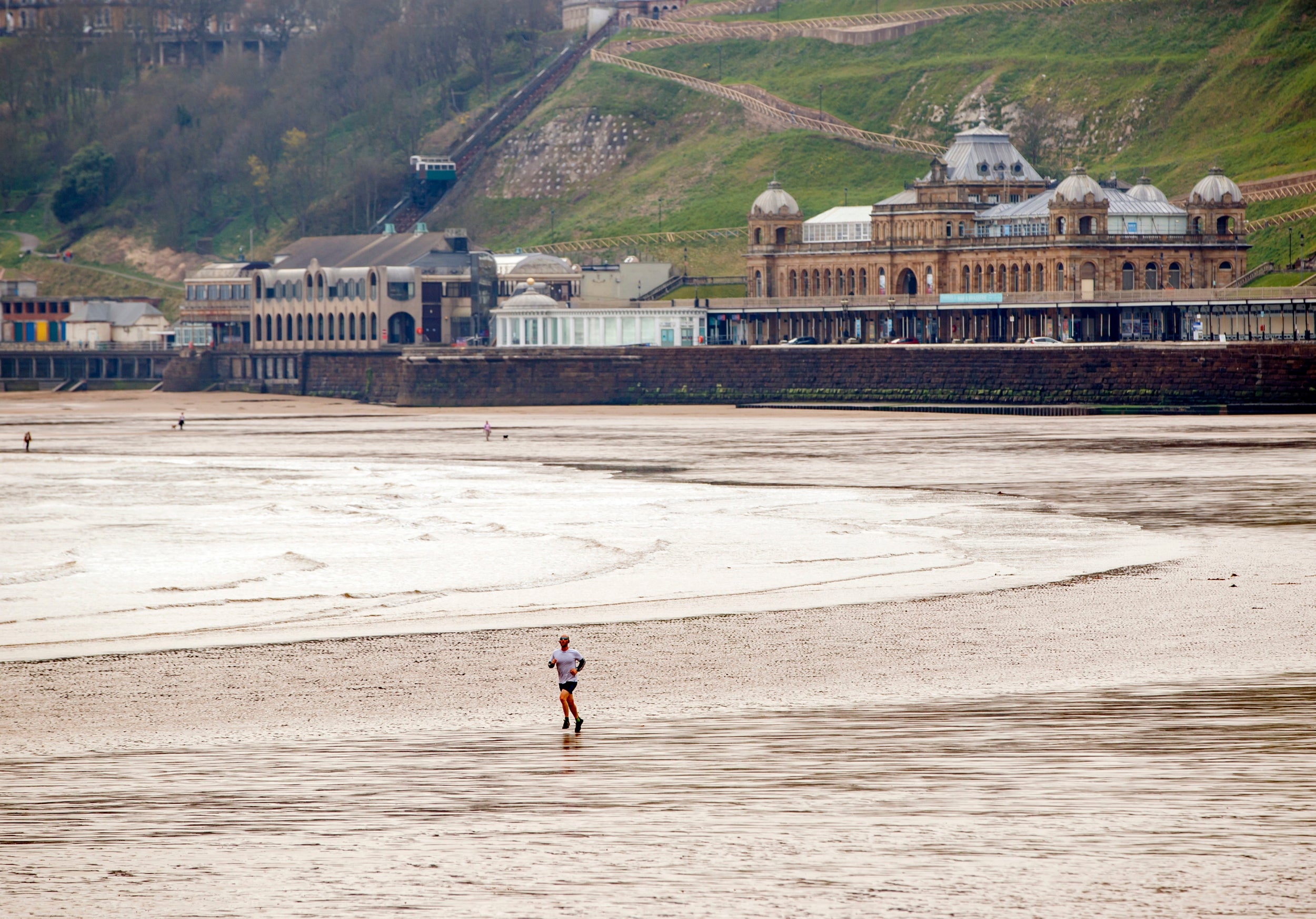
32/50 11 April 2020
A man jogs on an empty beach in Scarborough as the UK continues in lockdown to help curb the spread of the coronavirus
PA
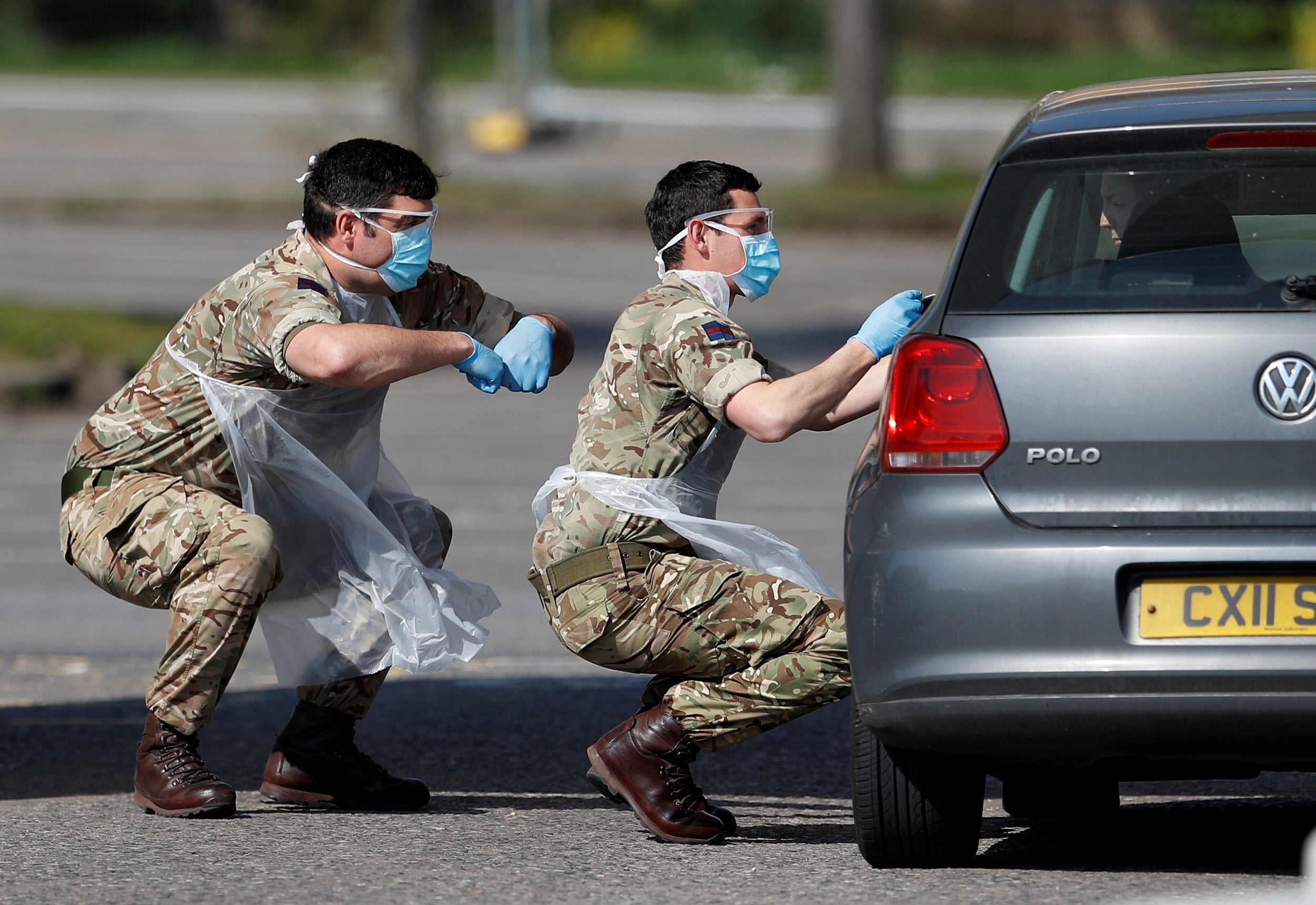
33/50 10 April 2020
Military personnel testing people at a coronavirus test centre in the car park of Chessington World of Adventures
Reuters
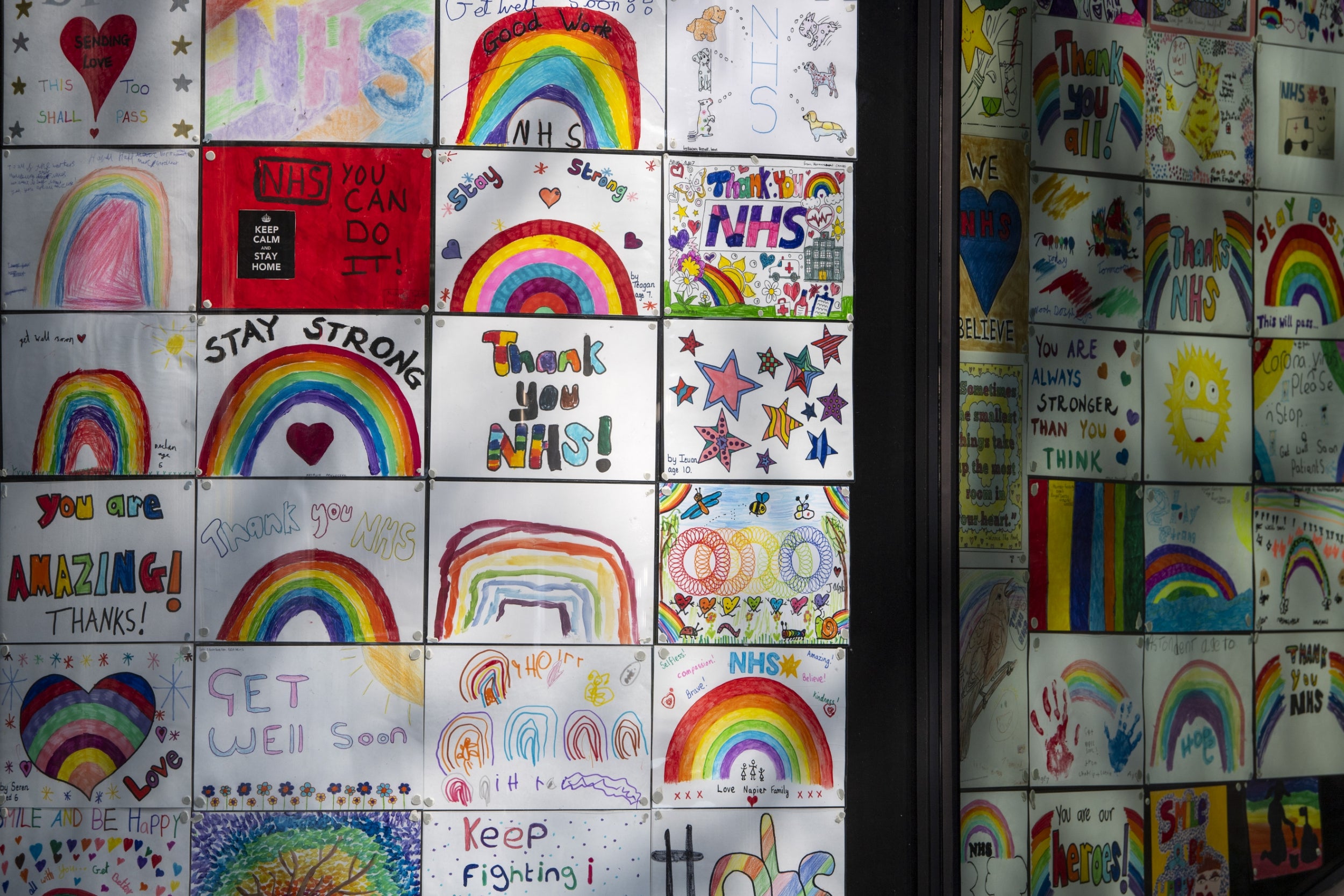
34/50 9 April 2020
Posters drawn by children displayed in support of the NHS in a building near St Thomas’ Hospital in London
Getty
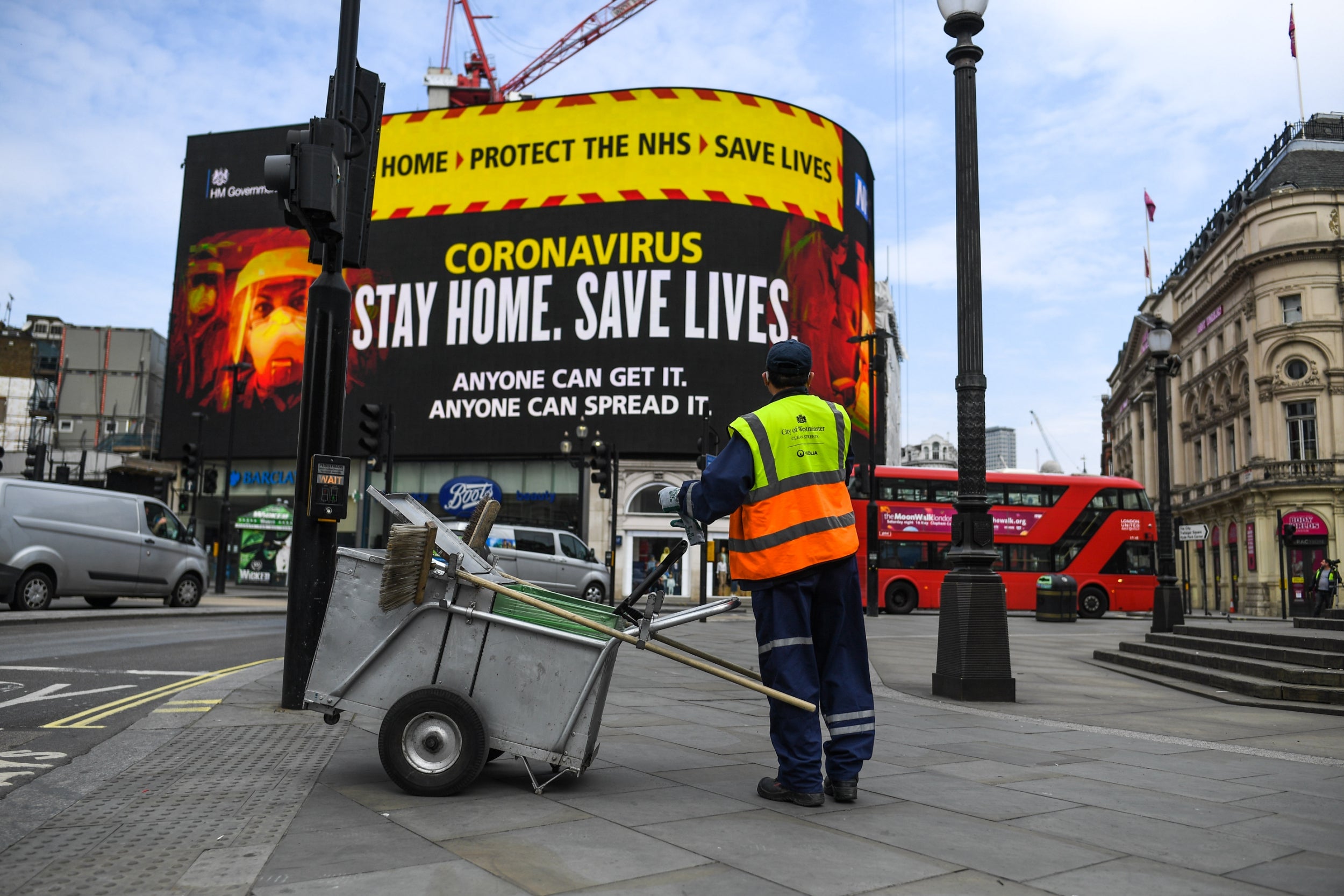
35/50 8 April 2020
A street cleaner in front of Coronavirus messaging on Picadilly Circus in London
Getty
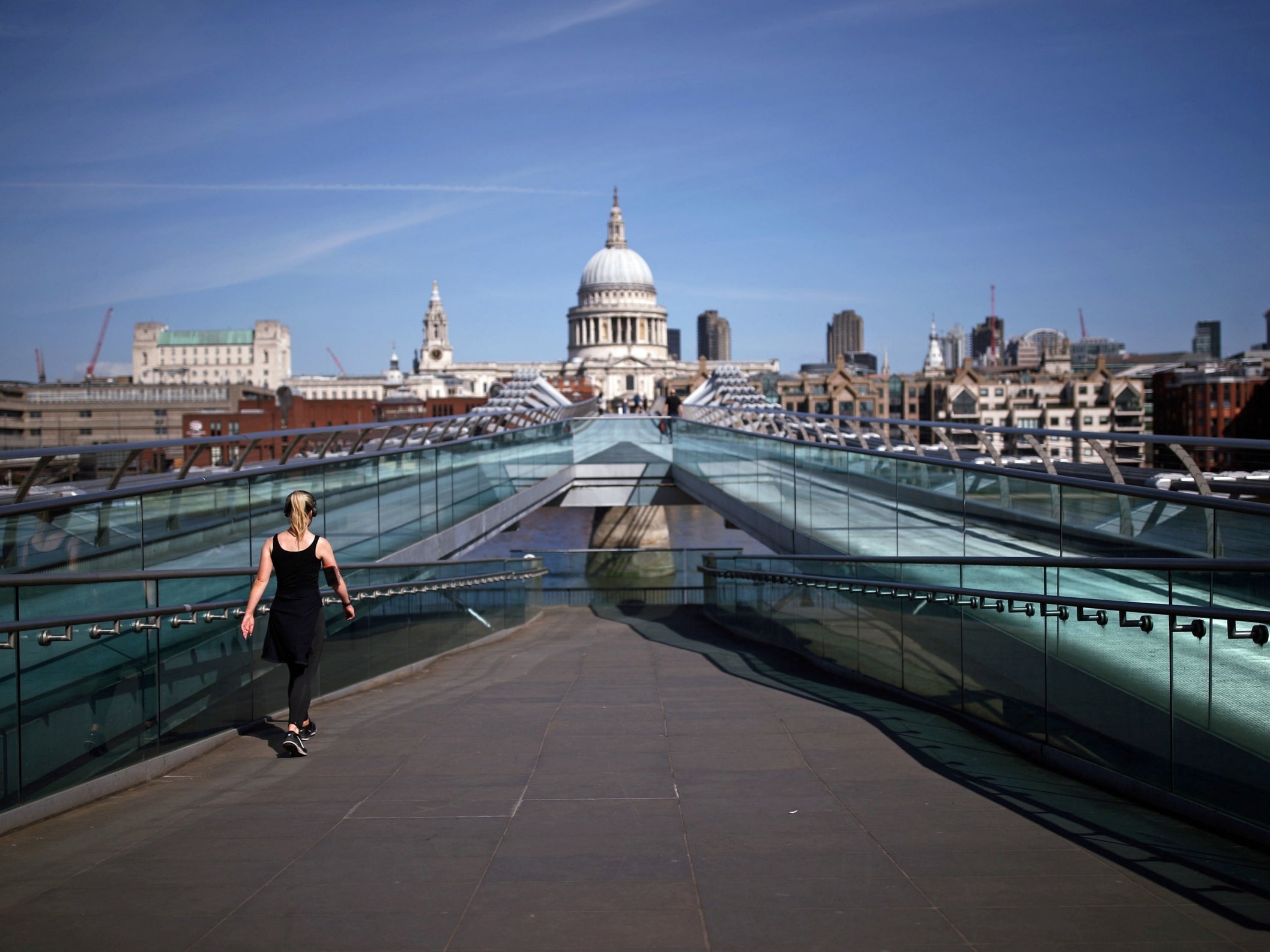
36/50 7 April 2020
A jogger on the Millennium Bridge in London, as the UK continues in lockdown to help curb the spread of the coronavirus
PA
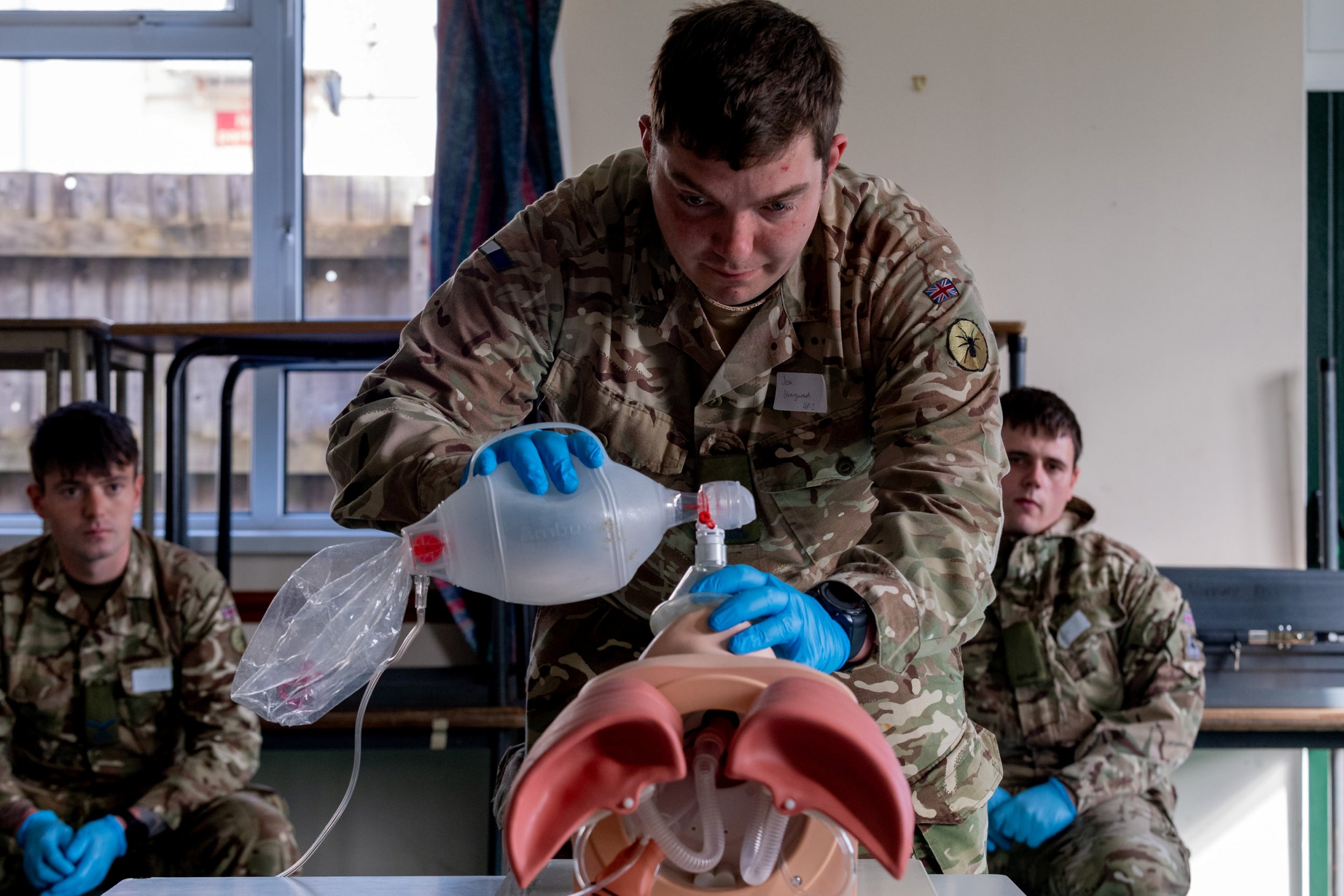
37/50 6 April 2020
A Royal Signals soldier practices during training held by the British Army. They are preparing them to support the Welsh Ambulance Service NHS Trust in the battle against coronavirus
Ministry of Defence/Reuters

38/50 5 April 2020
A police officer advises a woman to go home after spotting her enjoying the sun in Primrose Hill, London
AP
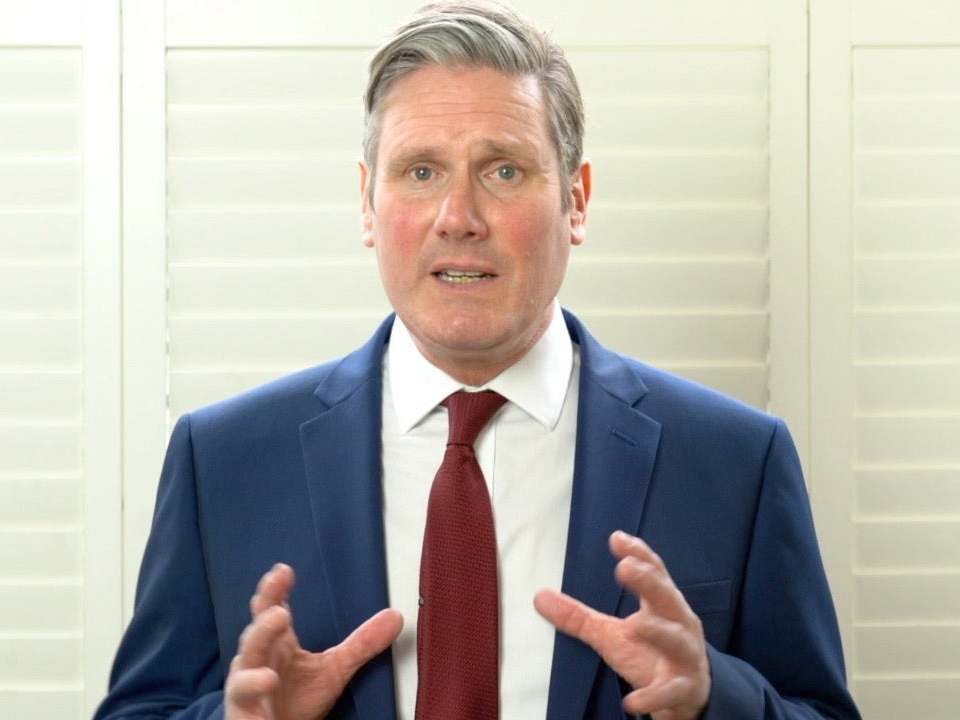
39/50 4 March 2020
New Leader of the Labour Party Keir Starmer speaks on the announcement of his victory in the leadership race of the Labour Party
AFP via Getty

40/50 3 April 2020
Health Secretary Matt Hancock and NHS staff stand on marks on the ground, put in place to ensure social distancing guidelines are adhered to, at the opening of the NHS Nightingale Hospital at the ExCel centre in London, a temporary hospital with 4000 beds which has been set up for the treatment of Covid-19 patients. PA Photo. Picture date: Friday April 3, 2020. Split into more than 80 wards containing 42 beds each, the facility will be used to treat Covid-19 patients who have been transferred from other intensive care units across London.
PA
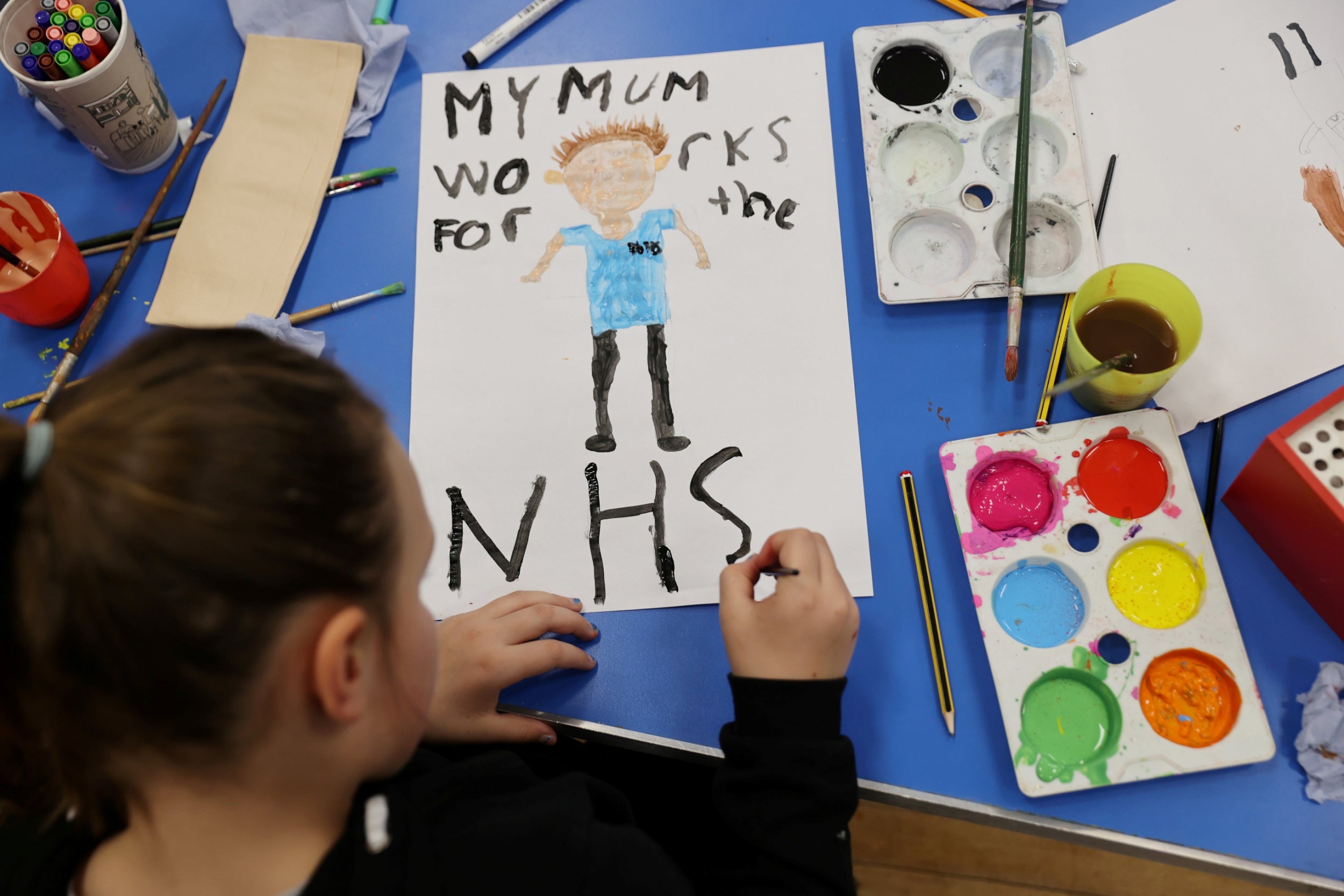
41/50 2 April 2020
A child at Westlands Primary School paints a poster in support of the NHS in Newcastle-under-Lyme
Reuters
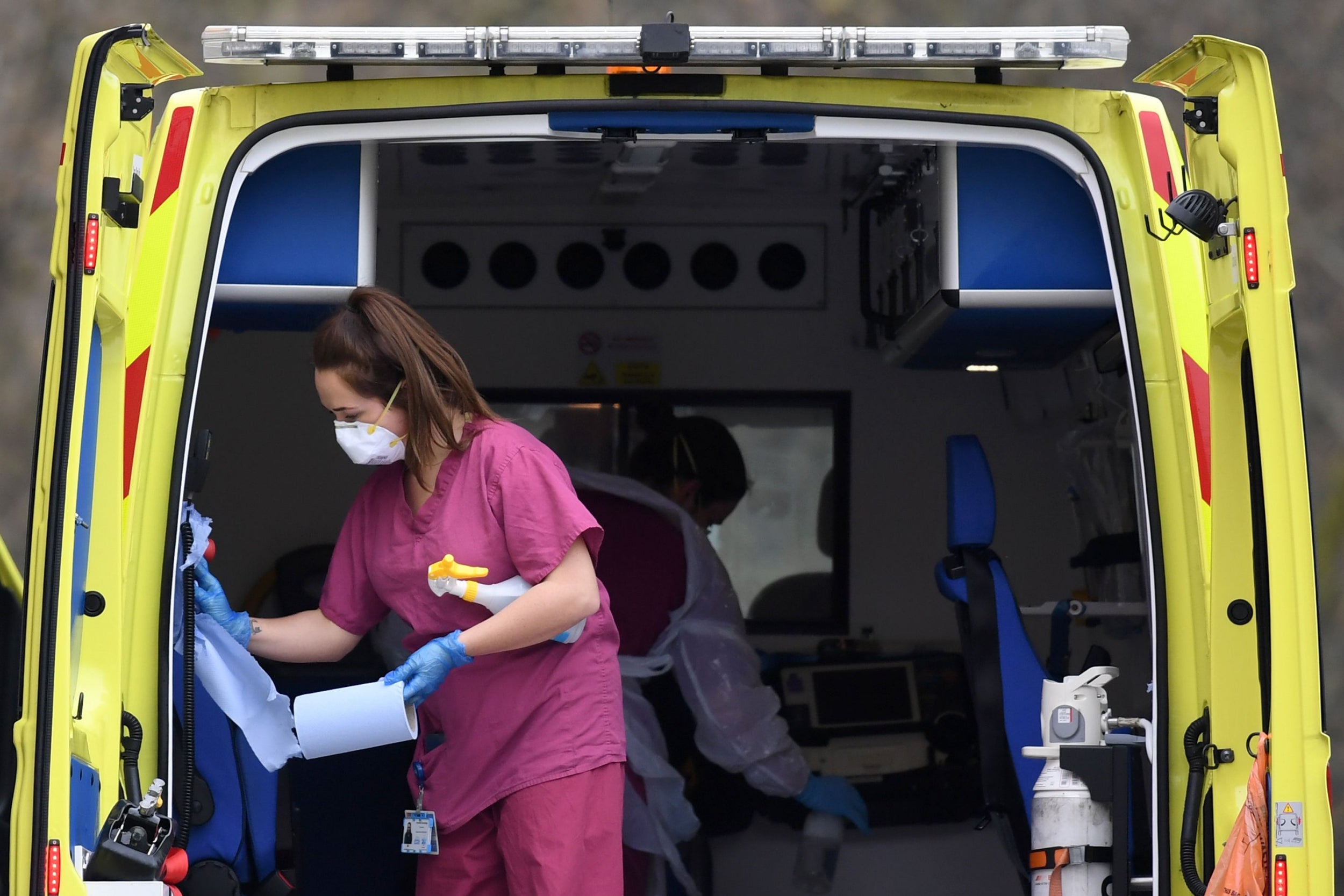
42/50 1 April 2020
Staff wearing PPE of gloves and face masks, as a preactionary measure against Covid-19, disinfect an ambulance after it arrived with a patient at St Thomas’ Hospital in north London
AFP via Getty
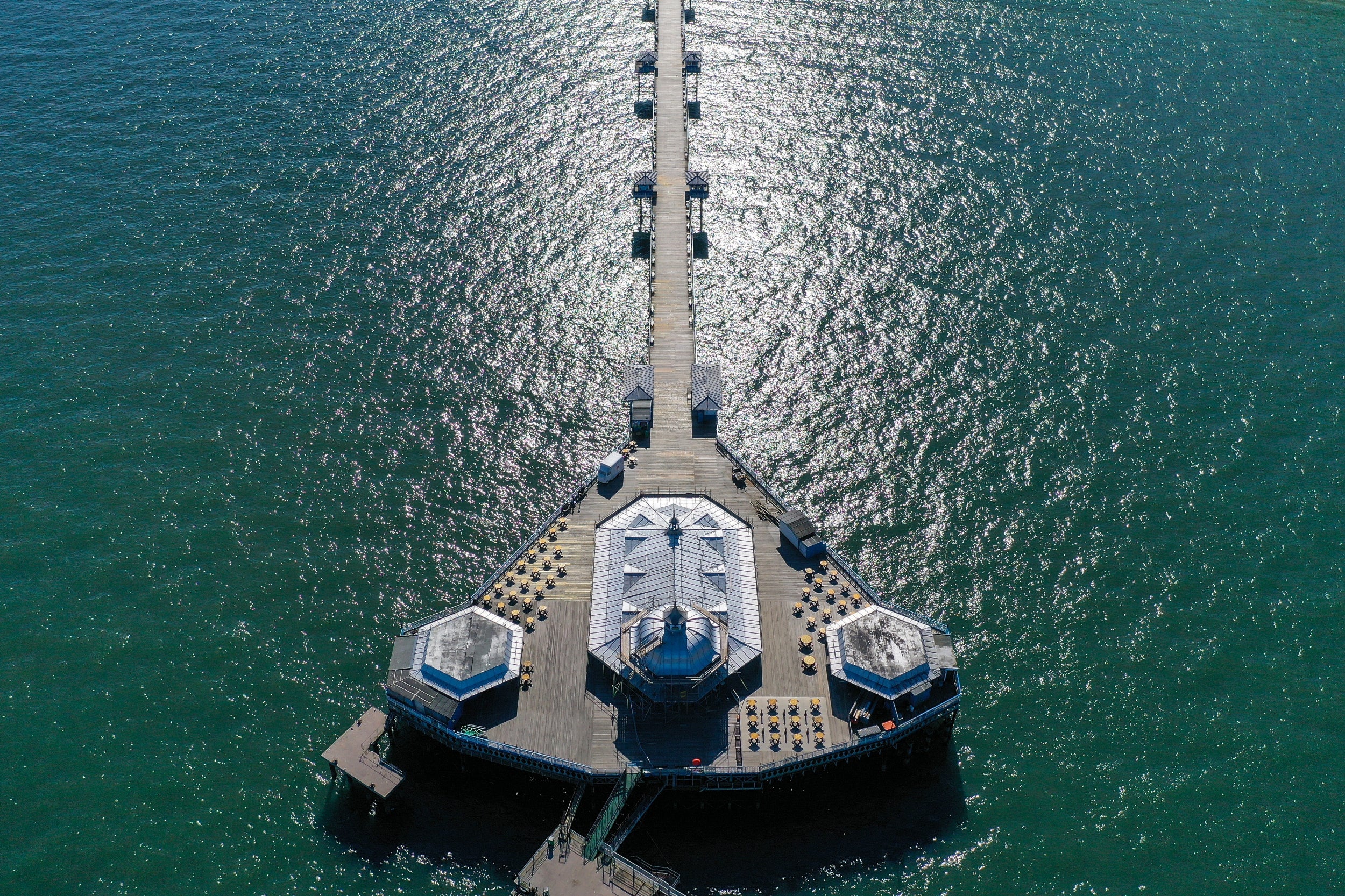
43/50 31 March 2020
Llandudno Pier remains closed and deserted of tourists during the pandemic lockdown in Wales
Getty

44/50 30 March 2020
Waves break against the pier at Tynemouth, on the North East coast
PA

45/50 29 March 2020
Waves crash over a car on the seafront during windy conditions in Broadstairs, Kent
PA

46/50 28 March 2020
Derbyshire Police dye the “blue lagoon” in Harpur Hill, Buxton black, as gatherings there are “dangerous” and are “in contravention of the current instruction of the UK Government”
PA
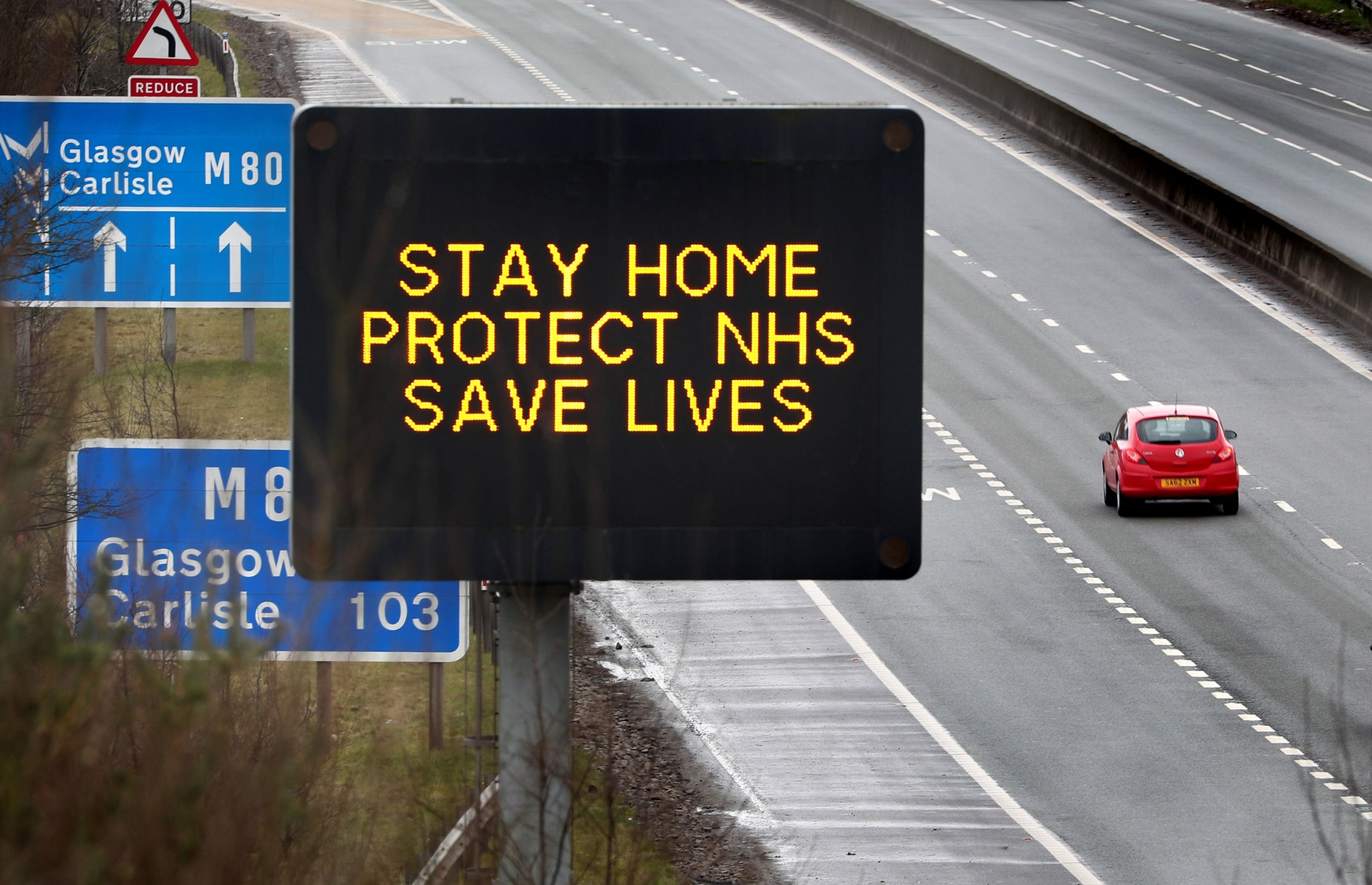
47/50 27 March 2020
A road sign advising drivers to ‘stay home protect NHS saves lives’ is visible on the M80 near Banknock as the UK continues in lockdown to help curb the spread of the coronavirus
PA
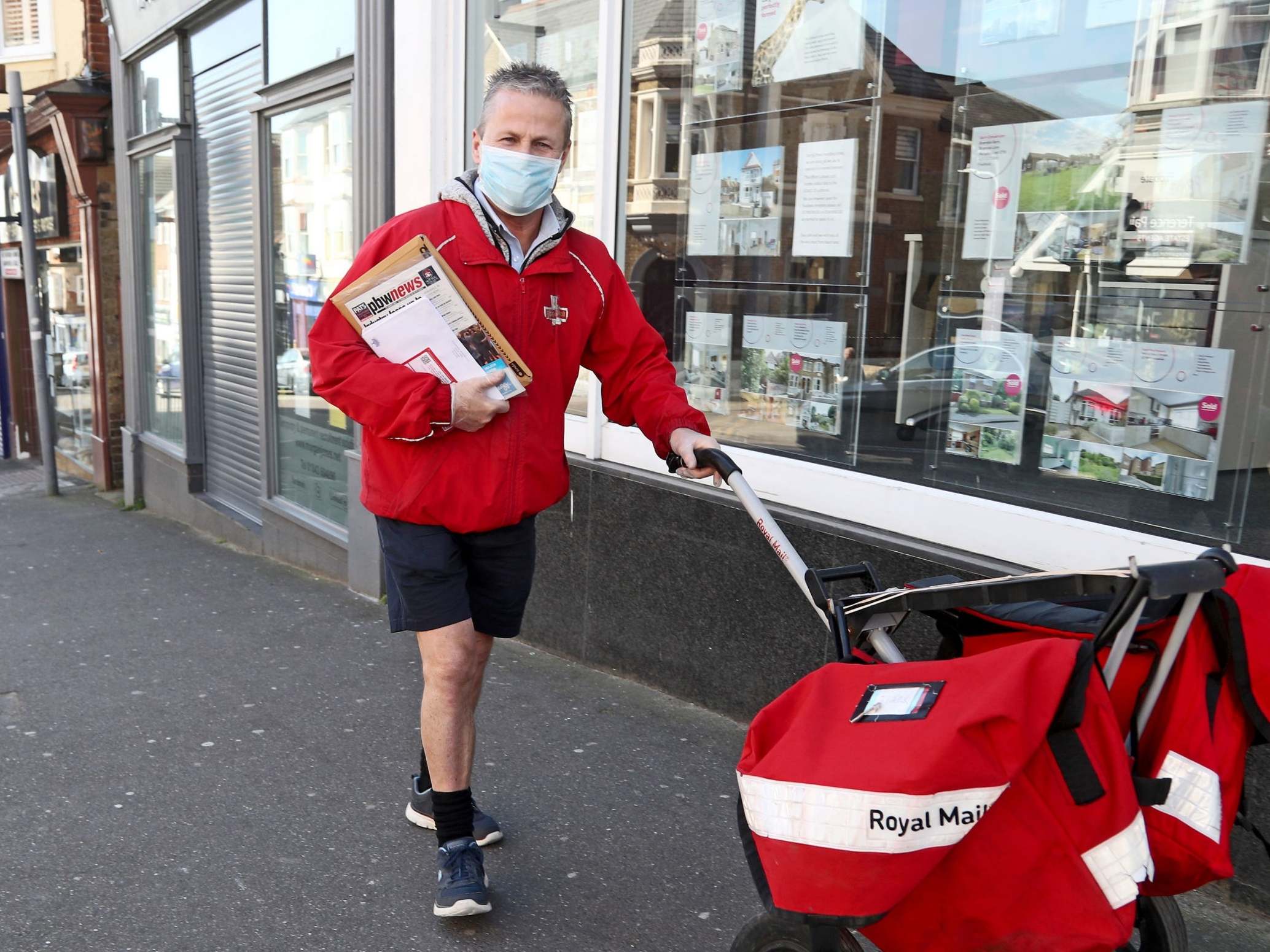
48/50 26 March 2020
A postman wears a mask and gloves to deliver letters in Broadstairs, Kent, after Prime Minister Boris Johnson has put the UK in lockdown to help curb the spread of the coronavirus. PA Photo. Picture date: Thursday March 26, 2020. The UK’s coronavirus death toll reached 463 on Wednesday.
PA

49/50 25 March 2020
Members of the public out exercising on Brighton beach at sunset
Getty
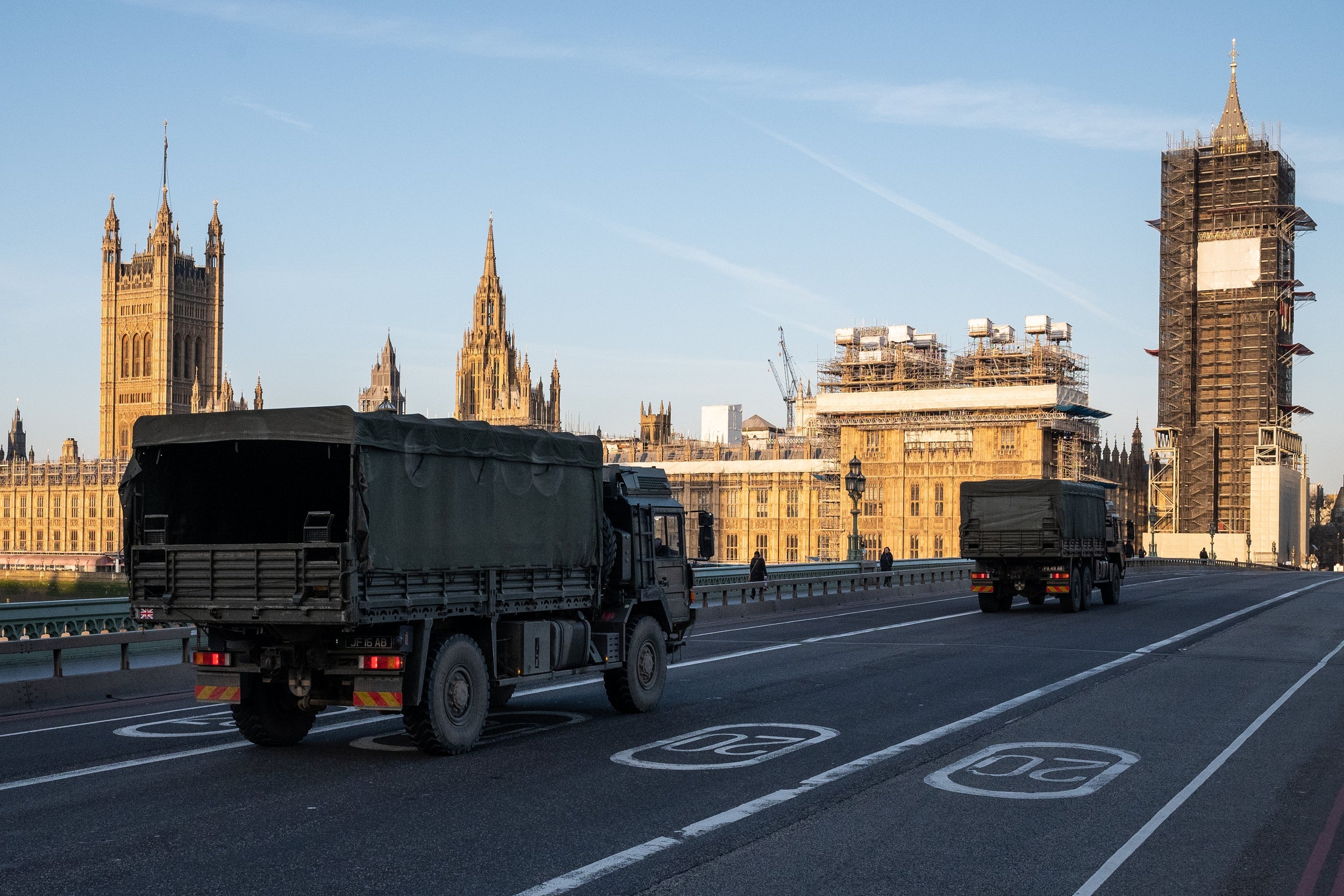
50/50 24 March 2020
Military vehicles cross Westminster Bridge after members of the 101 Logistic Brigade delivered a consignment of medical masks to St Thomas’ hospital
Getty

1/50 12 May 2020
Nurses from central London hospitals protest on international nurses day about the chronic underfunding of the NHS and other issues surrounding the health service outside the gates of Downing Street, London
PA

2/50 11 May 2020
Waves crash at Tynemouth pier on the North East coast
PA

3/50 10 May 2020
A woman passes street art and a poster in East London
Reuters

4/50 9 May 2020
Police patrol the beach in Brighton
Getty

5/50 8 May 2020
The British Royal Air Force Red Arrows conduct a fly past over the statue of former British Prime Minister Winston Churchill in London to commemorate the 75th Anniversary of Victory in Europe (VE Day) in Britain
MOD/Reuters

6/50 7 May 2020
Team GB sailor Eilidh McIntyre during a training session at her home in Portsmouth
Reuters

7/50 6 May 2020
Labour Party leader Keir Starmer listens to Prime Minister Boris Johnson speaking during PMQs
UK Parliament/AFP/Getty

8/50 5 May 2020
The sun appears to explode over the horizon in this montage of images captured by photographer Nick Lucas near his home in Ringwood, Hampshire. Nick took a number of pictures just a few seconds apart on a tripod mounted camera which were then combined to give the eye catching dawn image
Nick Lucas/SWNS

9/50 4 May 2020
Leeds Green Watch firefighters observe a minute’s silence outside the fire station in Kirkstall Rd, in memory their colleagues that lost their lives in the line of duty
PA

10/50 3 May 2020
Staff at The Berkeley hotel give food to ambulance workers
Reuters

11/50 2 May 2020
One of a small group of anti-lockdown protesters speaks to a police officer as they gather outside New Scotland Yard in Victoria, London
AFP via Getty

12/50 1 May 2020
Bonnie the Llama grazes in a field in the Scottish Borders alongside a sign supporting the NHS as the UK continues in lockdown
PA

13/50 30 April 2020
Colonel Tom Moore and his daughter Hannah celebrate his 100th birthday, with an RAF flypast provided by a Spitfire and a Hurricane over his home in Marston Moretaine. Colonel Moore, formerly a Captain, received a promotion in honour of his birthday and in recognition of the funds, in excess of £30m, he raised for the NHS by walking laps of his garden
Capture the Light Photography/Getty

14/50 29 April 2020
Britain’s Labour leader Keir Starmer speaks during Prime Minister’s Questions, as members of Parliament observe social distancing due to the coronavirus, in the House of Commons, London, Wednesday, April 29, 2020
UK Parliament/AP

15/50 28 April 2020
NHS staff at the Mater hospital in Belfast, during a minute’s silence to pay tribute to the NHS staff and key workers who have died during the coronavirus outbreak
PA

16/50 27 April 2020
The sun rises behind redundant oil platforms moored in the Firth of Forth near Kirkcaldy, Fife. Global oil prices have crashed after the coronavirus pandemic reduced demand, with analysts warning that the oil majors may be looking at one of their biggest quarter-on-quarter profitability hits in history.
PA

17/50 26 April 2020
Frankie Lynch celebrates on the Mall where the finish of the London Marathon was due to take place today after running 2.6 miles instead of 26 miles to raise money for The Running Charity
Reuters

18/50 25 April 2020
A muslim woman walks past balloons outside the National Hospital for Neurology and Neurosurgery in London
Reuters

19/50 24 April 2020
An empty Brighton Pier, closed during the Coronavirus pandemic as temperatures reach 20 degrees in the South East
Rex

20/50 23 April 2020
Farmers work with vehicles to prepare a field next to a field of flowering rapeseed near Pontefract, West Yorkshire
AFP/Getty

21/50 22 April 2020
The Northern Lights, the Milky Way and a Lyrid meteor at the Bathing House near Howick, Northumberland, as the Lyrid meteor shower reached its peak
PA

22/50 21 April 2020
Badger the Border Collie surrounded by bluebells at Shrawley Wood in Worcestershire
PA

23/50 20 April 2020
A dog walker on Blyth beach in Northumberland
PA

24/50 19 April 2020
A piece of coronavirus themed street art grafitti in East London
AFP via Getty

25/50 18 April 2020
Members of the City Specialist Cleaning team spray disinfectant around posts in the town centre of Eastleigh, Hampshire
PA

26/50 17 April 2020
A taped-up bench in the hamlet of Diglea, Greater Manchester
AFP/Getty

27/50 16 April 2020
A woman wearing a protective face mask and gloves walks past graffiti in Bow, London
Reuters

28/50 15 April 2020
A burned down mobile phone mast in London. According to reports, at least 20 mobile phone masts across Britain are believed to have been vandalised and government and telecom sources are increasingly concerned about the impact of conspiracy theories linking coronavirus to 5G networks
EPA

29/50 14 April 2020
The new Nightingale Hospital in Washington, Tyne and Wear, being fitted out
PA

30/50 13 April 2020
Walkers enjoy the bluebells in Wanstead Park in London
PA

31/50 12 April 2020
A woman prays at the closed doors of Westminster Cathedral ahead of the Easter morning mass in London
PA

32/50 11 April 2020
A man jogs on an empty beach in Scarborough as the UK continues in lockdown to help curb the spread of the coronavirus
PA

33/50 10 April 2020
Military personnel testing people at a coronavirus test centre in the car park of Chessington World of Adventures
Reuters

34/50 9 April 2020
Posters drawn by children displayed in support of the NHS in a building near St Thomas’ Hospital in London
Getty

35/50 8 April 2020
A street cleaner in front of Coronavirus messaging on Picadilly Circus in London
Getty

36/50 7 April 2020
A jogger on the Millennium Bridge in London, as the UK continues in lockdown to help curb the spread of the coronavirus
PA

37/50 6 April 2020
A Royal Signals soldier practices during training held by the British Army. They are preparing them to support the Welsh Ambulance Service NHS Trust in the battle against coronavirus
Ministry of Defence/Reuters

38/50 5 April 2020
A police officer advises a woman to go home after spotting her enjoying the sun in Primrose Hill, London
AP

39/50 4 March 2020
New Leader of the Labour Party Keir Starmer speaks on the announcement of his victory in the leadership race of the Labour Party
AFP via Getty

40/50 3 April 2020
Health Secretary Matt Hancock and NHS staff stand on marks on the ground, put in place to ensure social distancing guidelines are adhered to, at the opening of the NHS Nightingale Hospital at the ExCel centre in London, a temporary hospital with 4000 beds which has been set up for the treatment of Covid-19 patients. PA Photo. Picture date: Friday April 3, 2020. Split into more than 80 wards containing 42 beds each, the facility will be used to treat Covid-19 patients who have been transferred from other intensive care units across London.
PA

41/50 2 April 2020
A child at Westlands Primary School paints a poster in support of the NHS in Newcastle-under-Lyme
Reuters

42/50 1 April 2020
Staff wearing PPE of gloves and face masks, as a preactionary measure against Covid-19, disinfect an ambulance after it arrived with a patient at St Thomas’ Hospital in north London
AFP via Getty

43/50 31 March 2020
Llandudno Pier remains closed and deserted of tourists during the pandemic lockdown in Wales
Getty

44/50 30 March 2020
Waves break against the pier at Tynemouth, on the North East coast
PA

45/50 29 March 2020
Waves crash over a car on the seafront during windy conditions in Broadstairs, Kent
PA

46/50 28 March 2020
Derbyshire Police dye the “blue lagoon” in Harpur Hill, Buxton black, as gatherings there are “dangerous” and are “in contravention of the current instruction of the UK Government”
PA

47/50 27 March 2020
A road sign advising drivers to ‘stay home protect NHS saves lives’ is visible on the M80 near Banknock as the UK continues in lockdown to help curb the spread of the coronavirus
PA

48/50 26 March 2020
A postman wears a mask and gloves to deliver letters in Broadstairs, Kent, after Prime Minister Boris Johnson has put the UK in lockdown to help curb the spread of the coronavirus. PA Photo. Picture date: Thursday March 26, 2020. The UK’s coronavirus death toll reached 463 on Wednesday.
PA

49/50 25 March 2020
Members of the public out exercising on Brighton beach at sunset
Getty

50/50 24 March 2020
Military vehicles cross Westminster Bridge after members of the 101 Logistic Brigade delivered a consignment of medical masks to St Thomas’ hospital
Getty
Well-off families still able to work are likely to be spending less and saving more during the pandemic, while furloughed low-income families build up further debt.
Mr Johnson has faced criticism this week that changes to the UK’s lockdown rules to encourage more people back to work will put the poorest in society most at risk.
Lower paid workers will be under more pressure to return to jobs in which they are more likely to risk coming into contact with coronavirus, critics claim.
According to the IPPR report, up to 45 per cent of the furlough scheme’s funds, an estimated £10billion over three months, will be spent on rent and debt repayments to landlords, banks and other lenders.
At the same time households in the second highest income tier could be saving an extra £189 per week on average, it estimates.
The latest news on Brexit, politics and beyond direct to your inbox
The report also warns it will take longer for the economy to recover if many families emerge from the crisis with large debts and less money to spend.
The report warns: “Without steps to actively redress these inequalities and to ensure the risks of the crisis are fairly shared, the UK’s economic recovery is likely to be slow, uneven and unfair, worsening existing structural imbalances.”
The IPPR today calls for a series of measures to ensure banks, landlords and the more affluent take a larger share of the burden.
These include exploring the possibility of a freeze on rent, debts and bills for some badly affected households.
The report also calls on the government to consider a ban on dividends, to prevent ministers indirectly subsidising company shareholders.
Carys Roberts, IPPR’s executive director, said: “IPPR’s research finds that while millions of people across the country are seeing a hit to their incomes, the government is under-writing the income of banks and landlords without any obligation to take a similar hit. That amounts to an implicit bailout.
“We mustn’t repeat the mistakes of previous crises, by asking those least able to weather the crisis to make the greatest sacrifices. The economic risks and costs of the shutdown should be shared fairly across society.
“The government must urgently ensure that its programme of support is protecting those who need it. And as we emerge from this crisis, it will be critically important to rebuild a fairer economy, with those whose incomes have been protected contributing more.”



